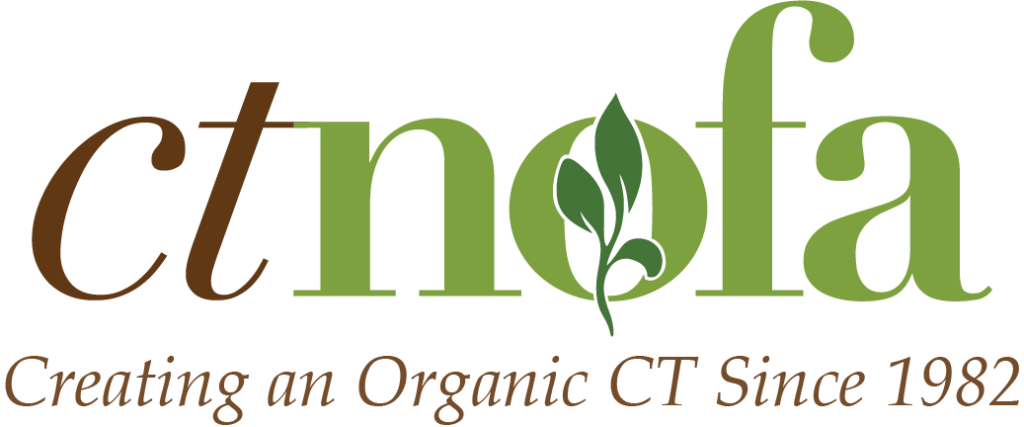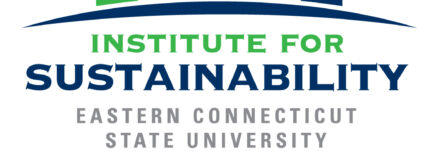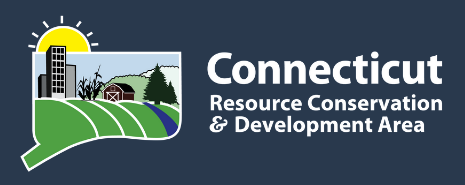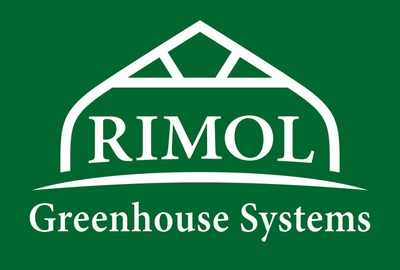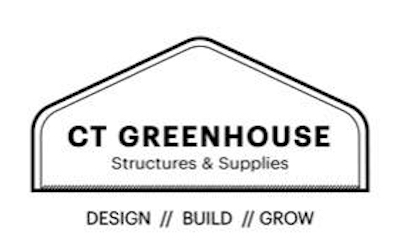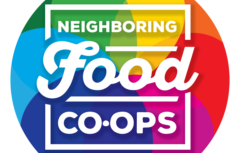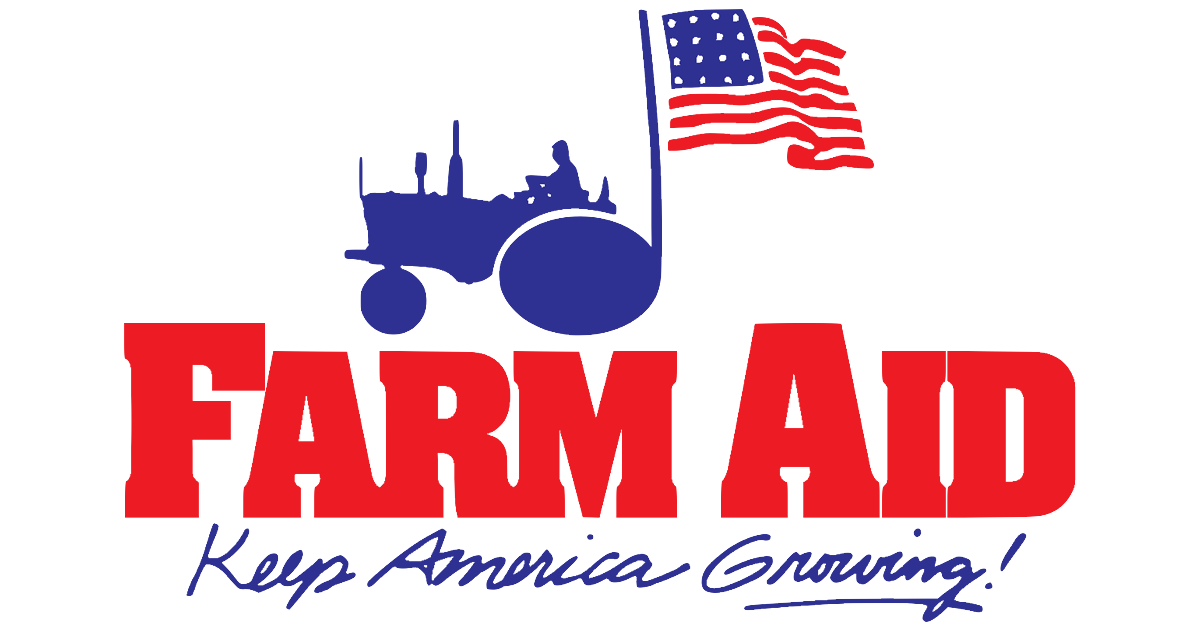
Workshops
Workshop details
Monday, march 6th Workshops
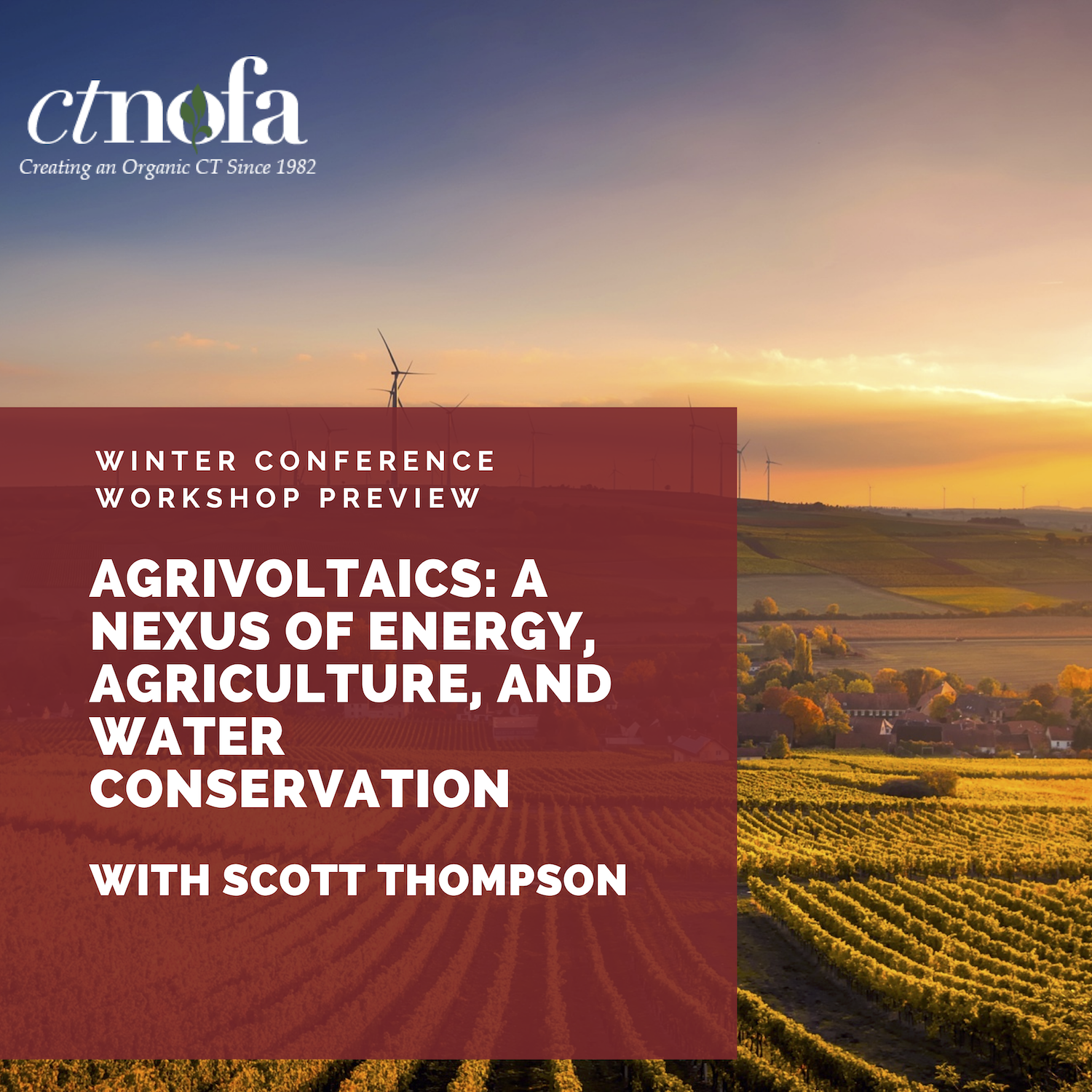
Agrivoltaics: A Nexus of Energy, Agriculture, and Water Conservation
12 PM
SCOTT THOMPSON
Tracks: Farming
The workshop will provide an overview of the design and application of solar photovoltaic systems and how these systems can be compatible with agricultural practices, including building soil health, crop production, and raising livestock. Varied and innovative approaches in the US and overseas in this emerging field will be presented.
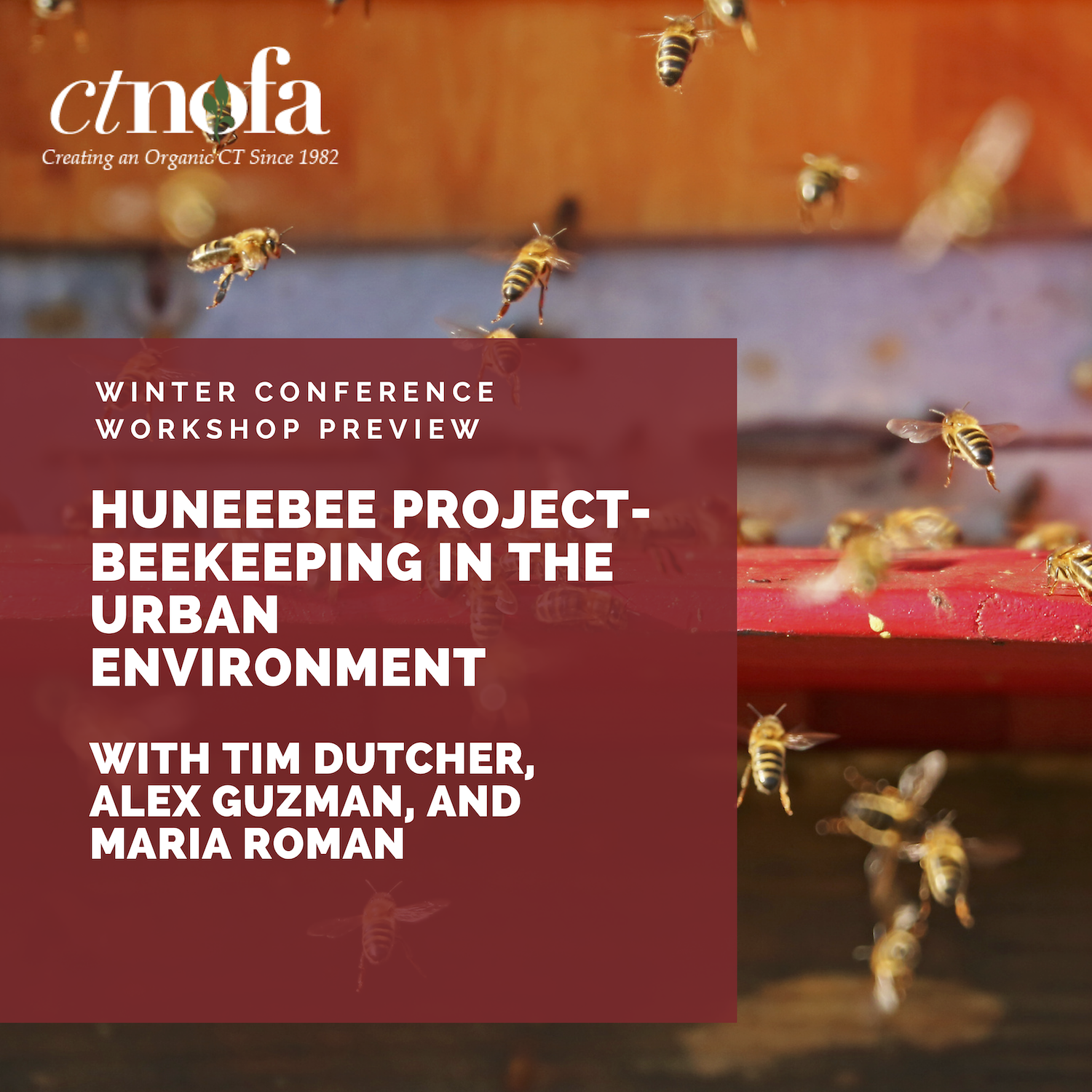
Huneebee Project ⏤ Beekeeping in the Urban Environment
3 PM
ALEX GUZMAN, MARIA ROMAN, and TIM DUTCHER
Tracks: Homesteading & Gardening
Join young beekeepers Alex and Maria as they share stories from Huneebee Project (HBP), a New Haven based non-profit social enterprise that develops job skills and connects youth to the environment through beekeeping. Joined by Tim (a beekeeper with 20 years experience), they’ll also happily answer your beekeeping questions!
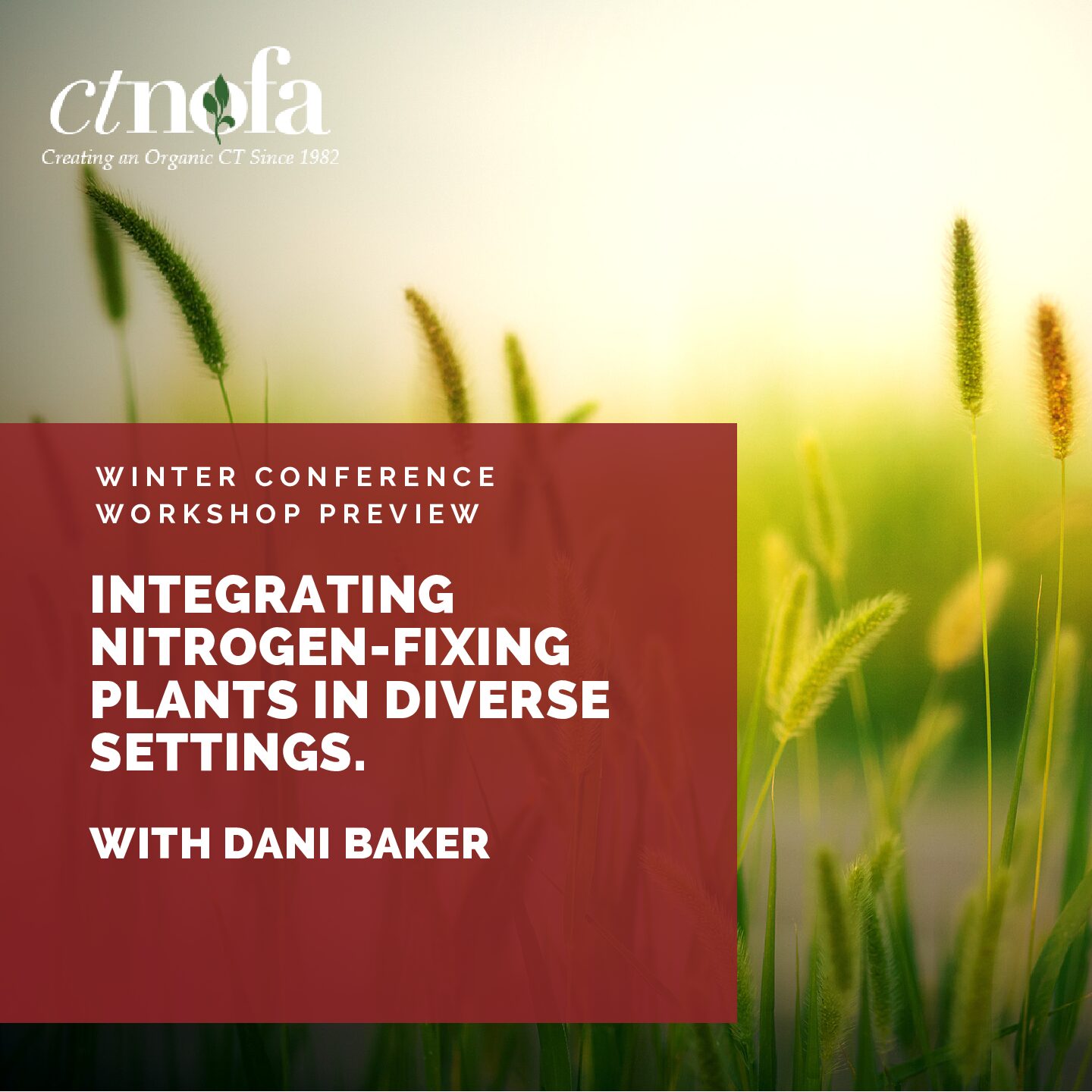
Integrating Nitrogen-Fixing Plants in Diverse Settings
3 PM
DANI BAKER | The Enchanted Edible Forest and Cross Island Farms
Tracks: Organic Land Care, Homesteading & Gardening, Farming, Soil Health
Instead of adding fertilizer, pepper your planting with nitrogen-fixing plants! Over 20 nitrogen-fixers from groundcovers to tall trees will be described, each of which can be integrated into your orchard, pasture, berry bush plot, annual vegetable garden, and more! Attendees will be inspired to add these plants to their edible landscape.
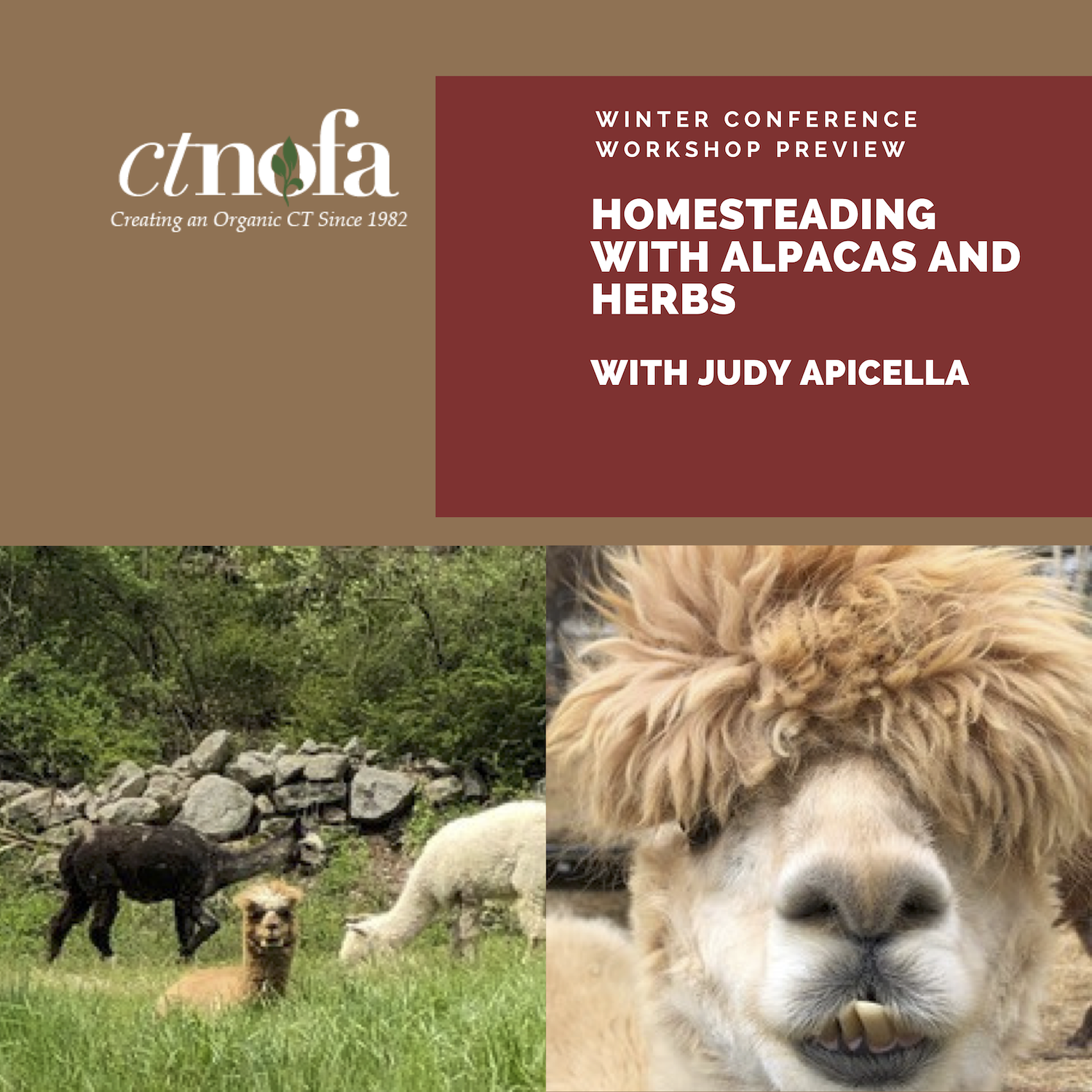
Homesteading with Alpacas and Herbs
7 PM
JUDY APICELLA | Home Harvested Herbals / Bella Alpacas
Tracks: Homesteading & Gardening
Bella Alpacas rescues alpacas and uses their fiber to make socks, and they harvest herbs from their land to make herbal formulas. These products support their alpaca sanctuary. This workshop will discuss caring for alpacas, harvesting herbs, making herbal products, and living your dream with nature.
Tuesday, March 7th Workshops
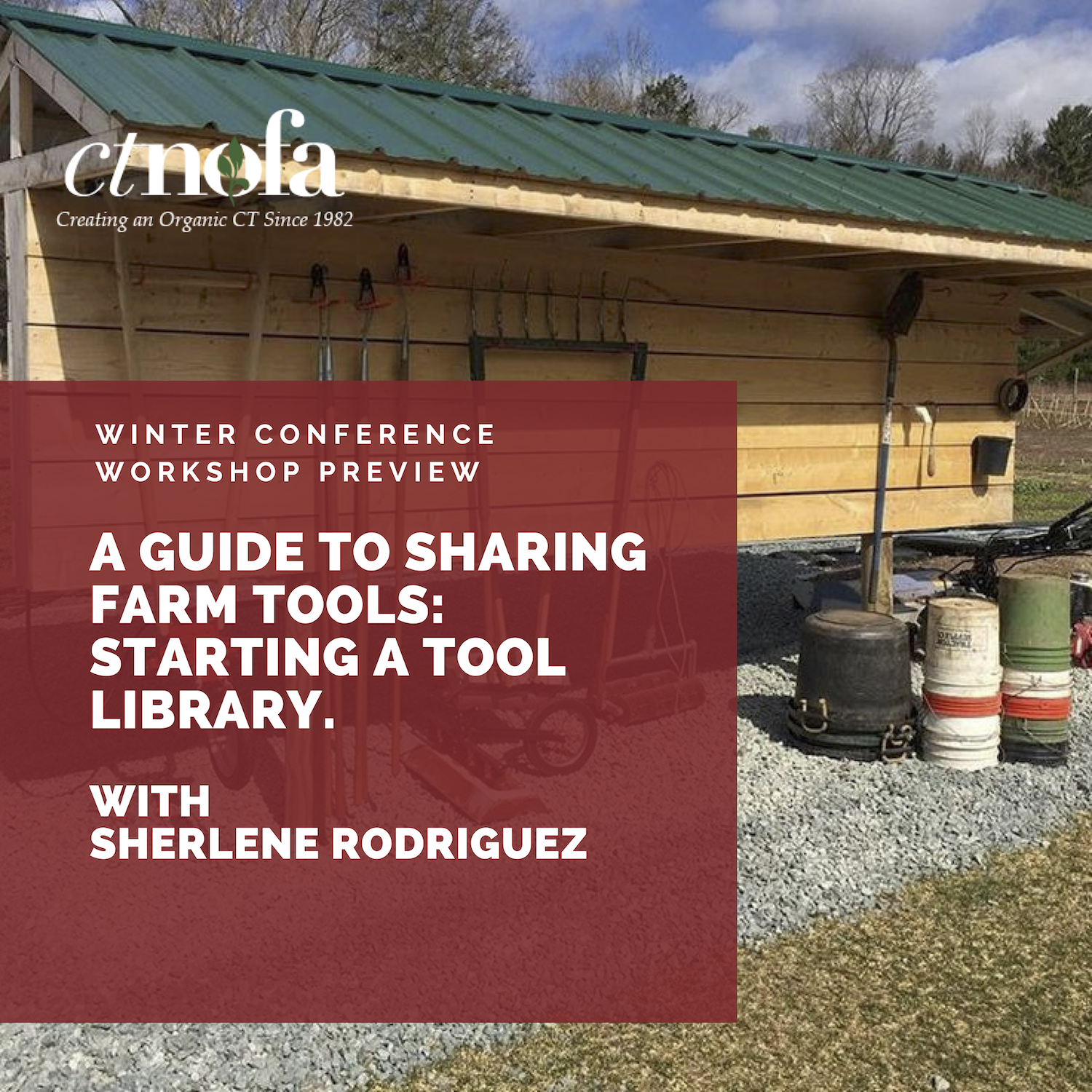
A Guide to Sharing Farm Tools: Starting a Tool Library
12 PM
SHERLENE RODRIGUEZ | CT NOFA Farm Share Program And Events Coordinator
Tracks: Beginning Farmer, Farming
Shared tool and equipment libraries can be an important piece in reducing some challenges farmers face. It is a chance for growers to practice collective action and participatory governance while adding precious dollars to bottom lines. We will cover a how-to guide to setting up a successful tool lending network.
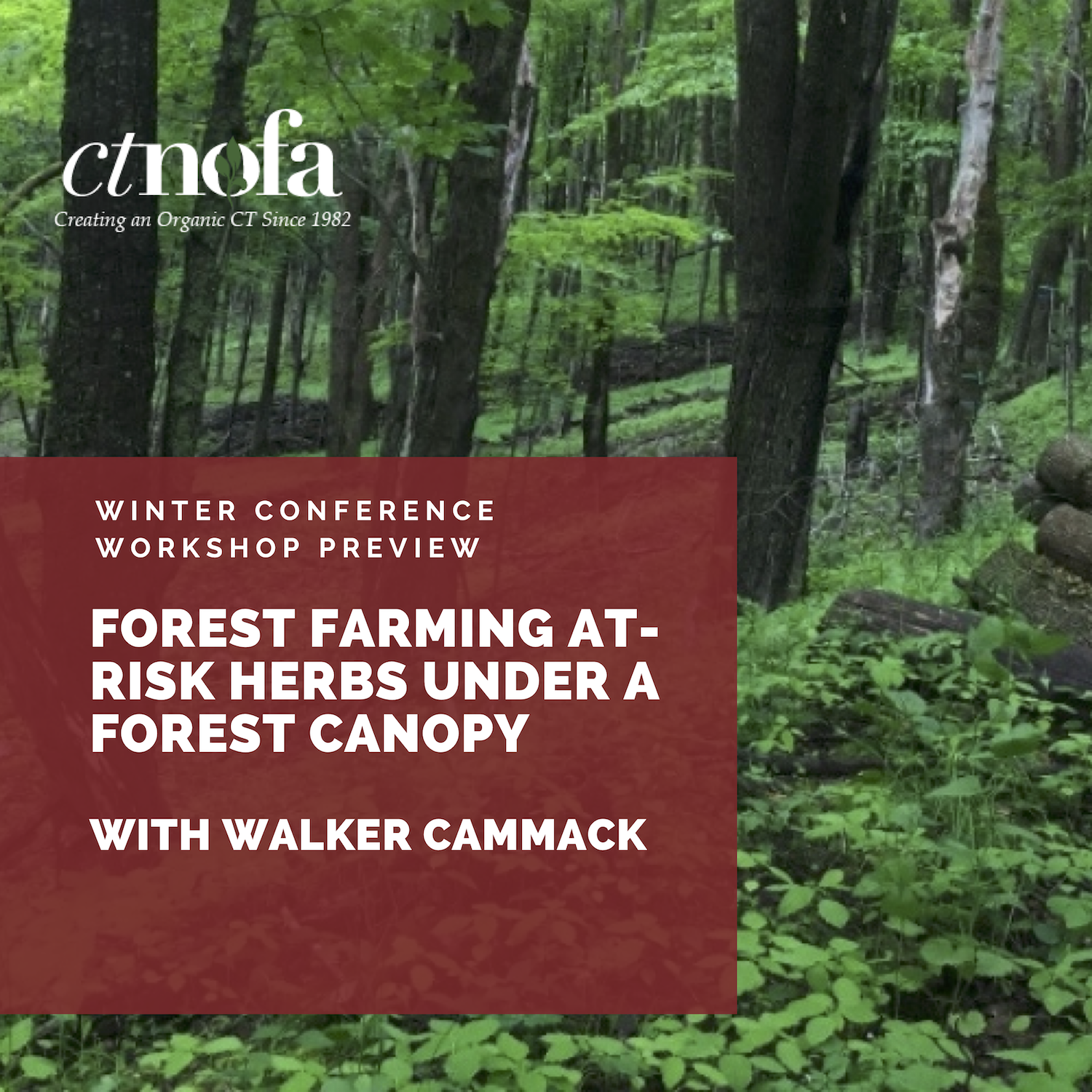
Forest Farming: At-Risk Herbs Under a Forest Canopy
3 PM
WALKER CAMMACK | Northeast Forest Farmers Coalition (Yale School of the Environment)
Tracks: Homesteading & Gardening, Farming
Participants will learn the basics of how to successfully farm botanicals, such as ginseng, ramps, bloodroot, goldenseal, and black cohosh in a wild-simulated/woods grown setting. This will include a look into the process of species and site selection, as well as an overview of best practices.
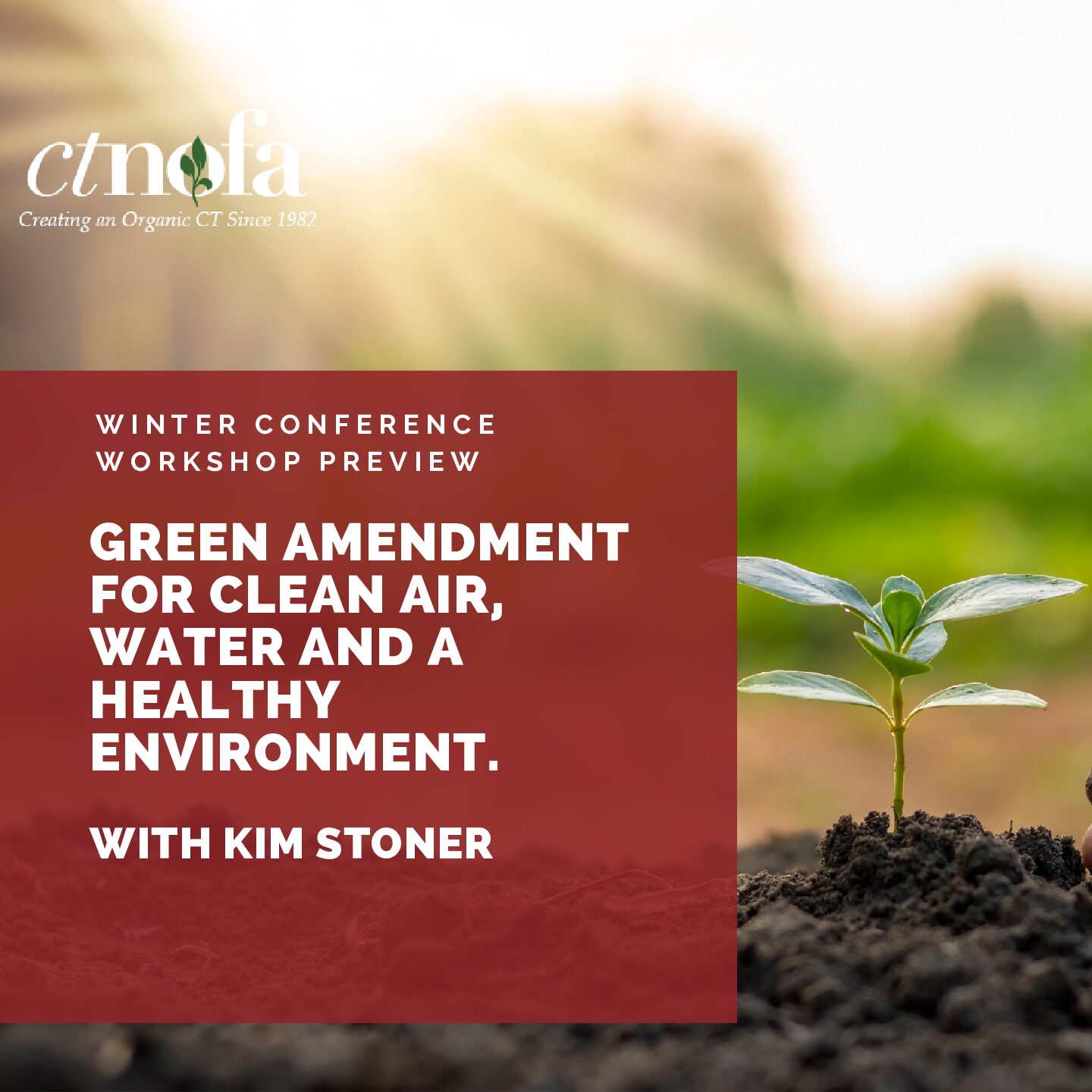
Green Amendment for Clean Air, Clean Water, and a Healthy Environment
7 PM
DR. KIMBERLY STONER | CT NOFA Director of Advocacy
Tracks: Activism & Policy
There is currently no right to clean air, clean water, and a healthy environment in either the constitutions of Connecticut or the United States. The Green Amendment to the Connecticut constitution would put those rights into the state Bill of Rights. Join Kim Stoner to discuss ways to help get this through the state legislature and into law!
Wednesday, March 8th Workshops
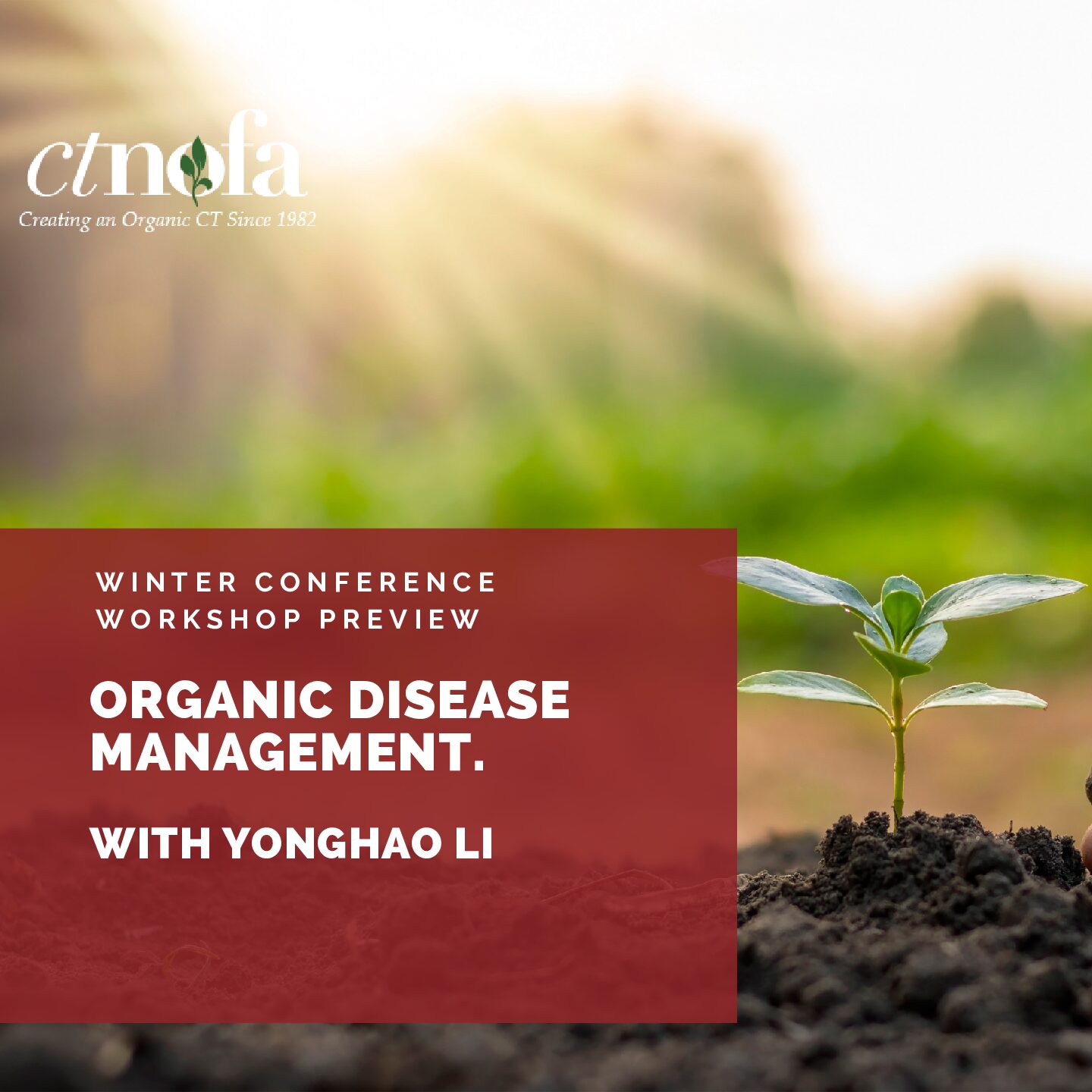
Organic Plant Disease Management
12 PM
YONGHAO LI | The Connecticut Agricultural Experiment Station
Tracks: Organic Land Care, Homesteading & Gardening, Farming
Organic gardening is becoming more popular as people worry more about health and food safety issues. A big challenge for growers and homeowners is to manage diseases without using pesticides in organic gardens. This presentation will discuss eco-friendly approaches to disease management that farmers, gardeners, and home growers can use.
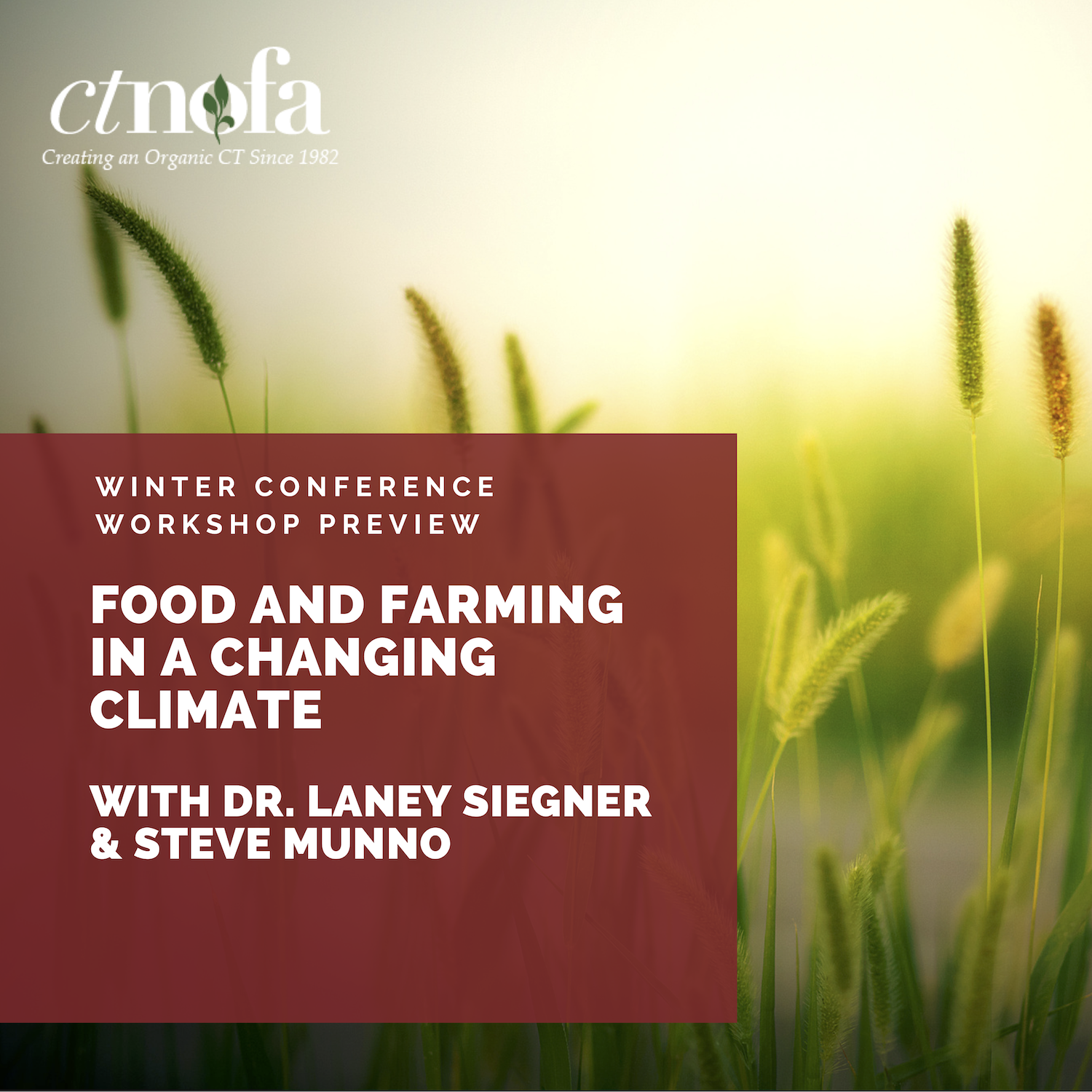
Food and Farming in a Changing Climate
3 PM
DR. LANEY SIEGNER & STEVE MUNNO
Tracks: Homesteading & Gardening, Farming
In this workshop we’ll discuss the interconnections between the food system and climate system; how food & agriculture impacts climate change, and how climate change impacts food & agriculture. We’ll explore the adaptation and mitigation practices being implemented on organic and regenerative farms, and discuss what we can do to positively impact/stabilize the climate system, and in turn improve the food system.
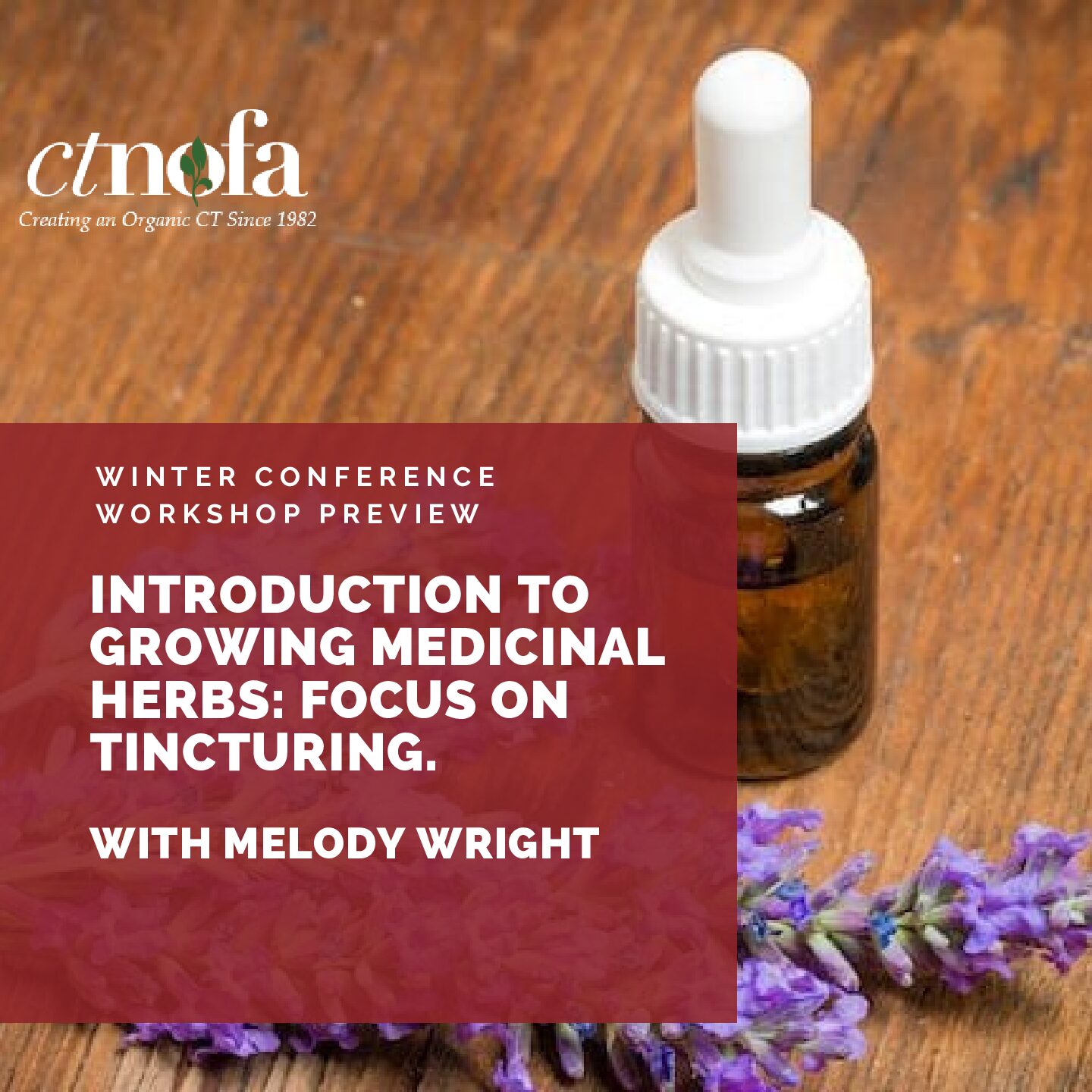
Introduction to Growing Medicinal Herbs: Focus on Tincturing
3 PM
MELODY WRIGHT | Pleasant Valley Botanicals, LLC
Tracks: Homesteading & Gardening
This workshop will cover seed starting, growing, and harvesting of some popular medicinal and culinary herbs. Discussion topics will include agro-ecology, mycorrhizal inoculants, favorite herbs for pollinators, cold stratification, tools, direct sow versus transplantation, and some favorite herbs to grow. We’ll also cover tincture making and popular herbs to grow and process by tincturing.
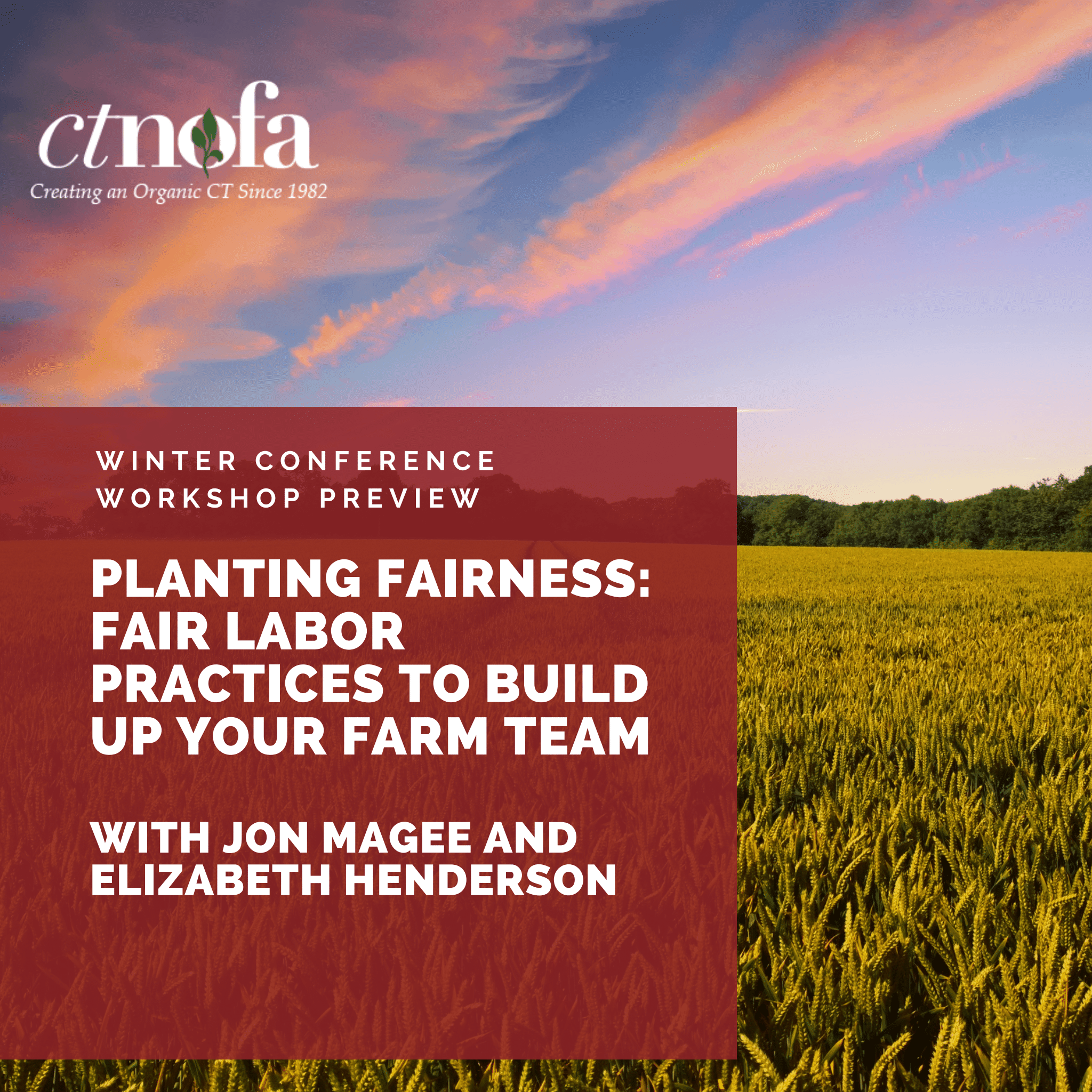
Planting Fairness: Fair Labor Practices to Build Up Your Farm Team
7 PM
JON MAGEE & ELIZABETH HENDERSON | Agricultural Justice Project
Tracks: Activism & Policy, Farming
Small farms need healthy relationships among farmers, workers, and customers. This workshop shares workplace policies and resources to help your farm become a more fair and collaborative workplace, retain dedicated employees, prevent injuries, and build a workplace culture of solidarity and cooperation that benefits everyone on the farm.
Thursday, March 9th Workshops
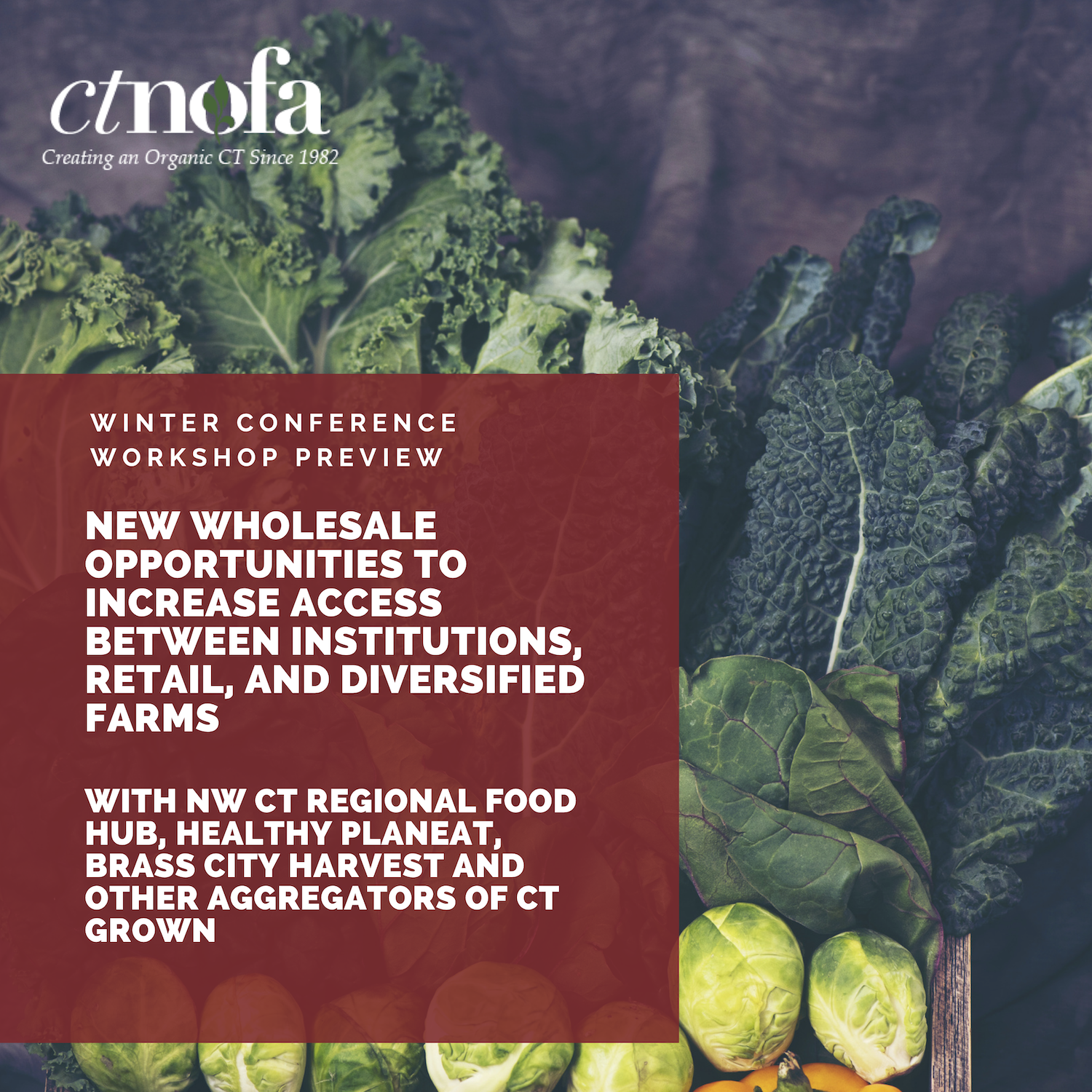
New Wholesale Opportunities to Increase Access between Institutions, Retail, and Diversified Farms
12 PM
NORTHWEST CT REGIONAL FOOD HUB, HEALTHY PLANEAT, BRASS CITY HARVEST, and others
Tracks: Activism & Policy, Farming
Join local food access businesses connecting Connecticut diversified farms with schools, addressing food security with direct to consumer models, and magnifying marketing strategies for farms across the state. Farmers and buyers will learn how they can work with these businesses and what the benefits and requirements are. With Renee Giroux (The Northwest CT Regional Food Hub), Rosemary Ostfeld (Healthy PlanEat), and Michele Morcey (Brass City Food Hub).
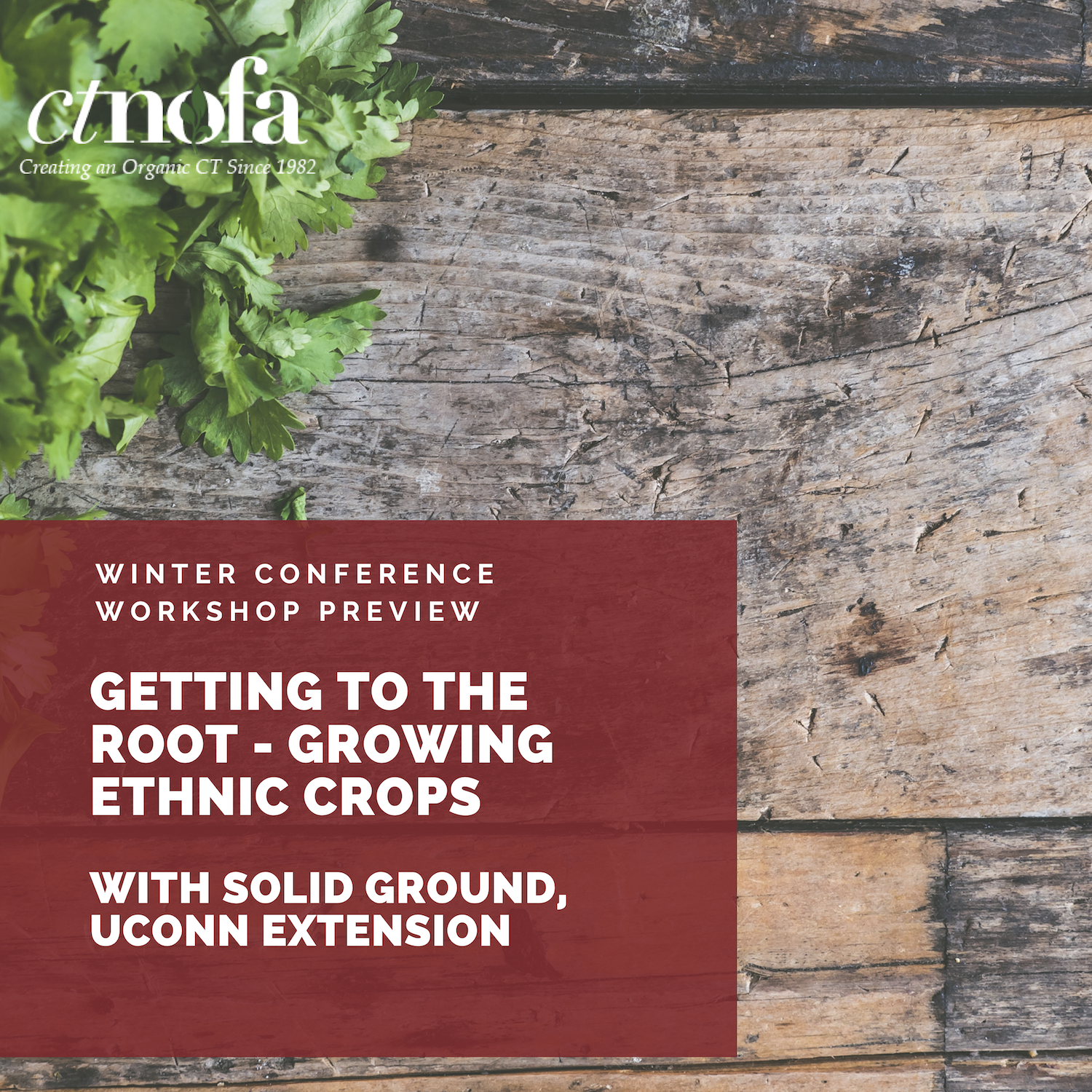
Getting To The Root ⏤ Growing Ethnic Crops
12 PM
SOLID GROUND, UCONN EXTENSION
Tracks: Farming
Join UConn Extension’s Solid Ground Program as they continue their Getting To The Root Series, featuring short videos (5 min) + farmer panel discussions that explore the entrepreneurial spirit of new farmers. This workshop features farmer Juliet Munhenga, plus a panel of growers to discuss their various models growing ethnic crops.
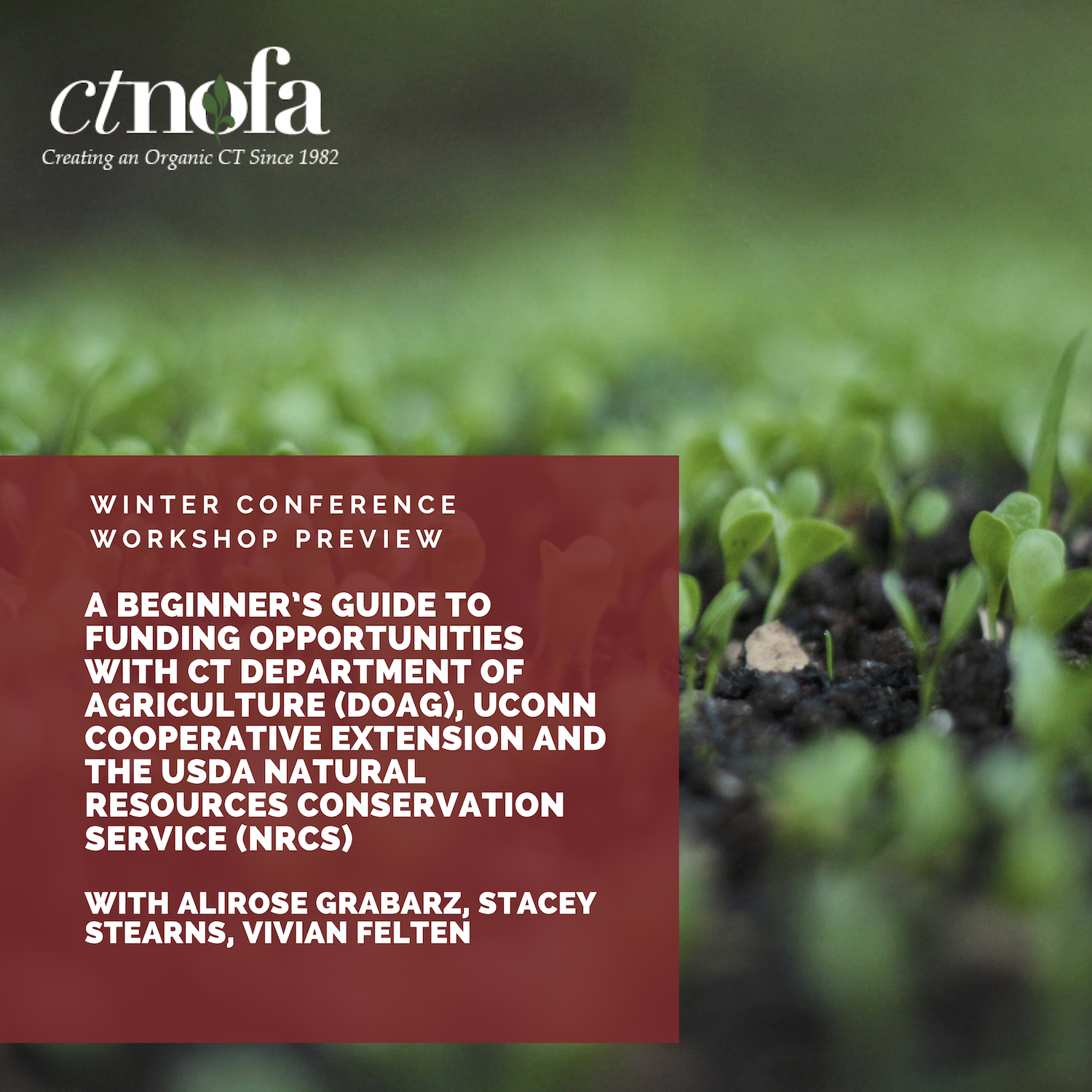
A Beginner’s Guide To Funding Opportunities With CT Department of Agriculture (DoAG), UCONN Cooperative Extension, and The USDA Natural Resources Conservation Service (NRCS)
3 PM
ALIROSE GRABARZ, STACEY STEARNS, and VIVIAN FELTEN
Tracks: Beginning Farmer, Farming
This workshop will cover funding opportunities for new and beginning farmers, including eligibility components, Organic Certification Cost Share program, business planning, registering your farm businesses, Farm Tax Exemption permits, and grant writing tips and tricks.
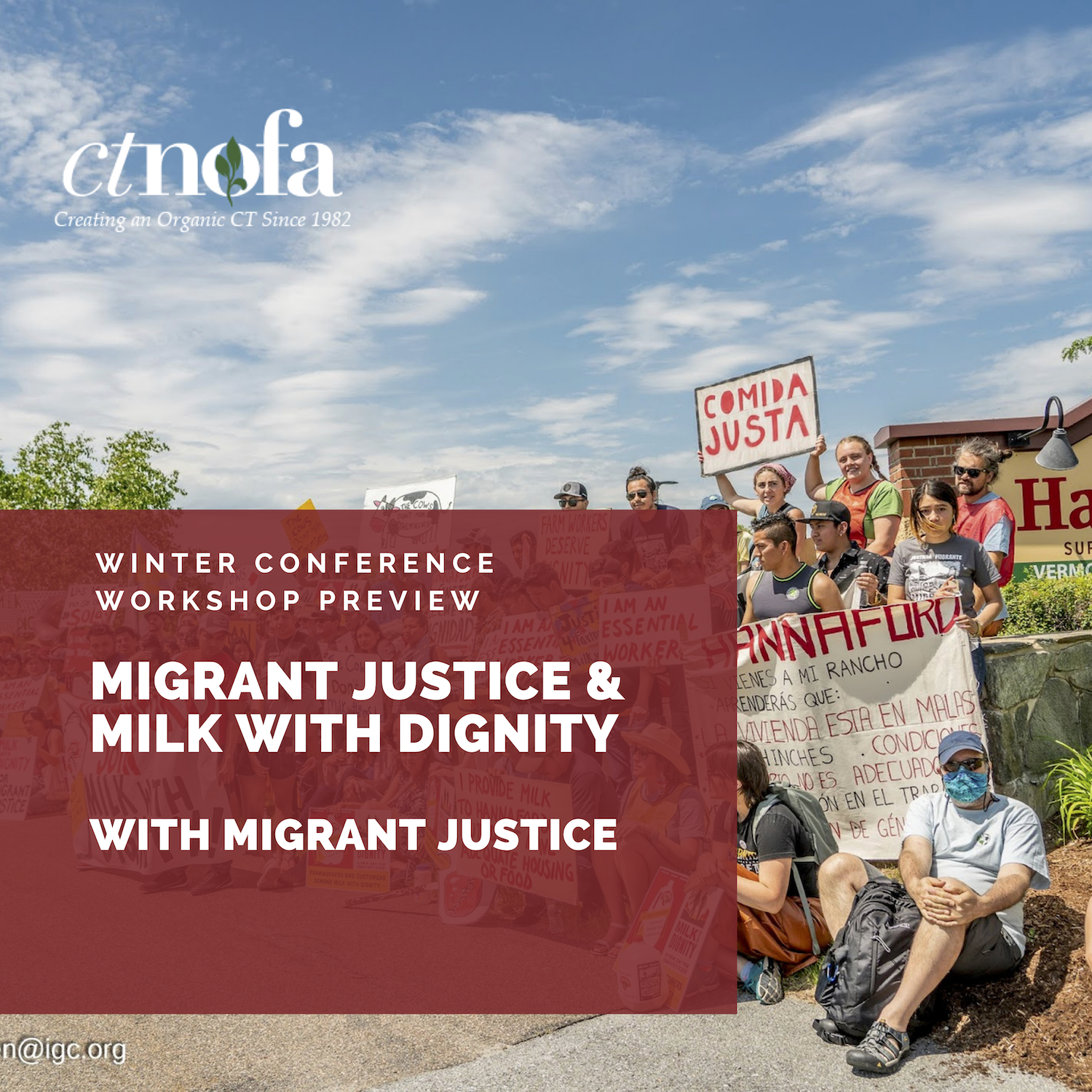
Migrant Justice & Milk with Dignity
3 PM
MIGRANT JUSTICE
Tracks: Activism & Policy
Join us to learn about migrant justice and the Milk with Dignity campaign with Hannaford! Milk with Dignity brings together dairy farmworkers, consumers, farmers, and corporate buyers with the goal of fostering human rights, sustainability, dairy farm viability, and an ethical supply chain for retail food companies and consumers.
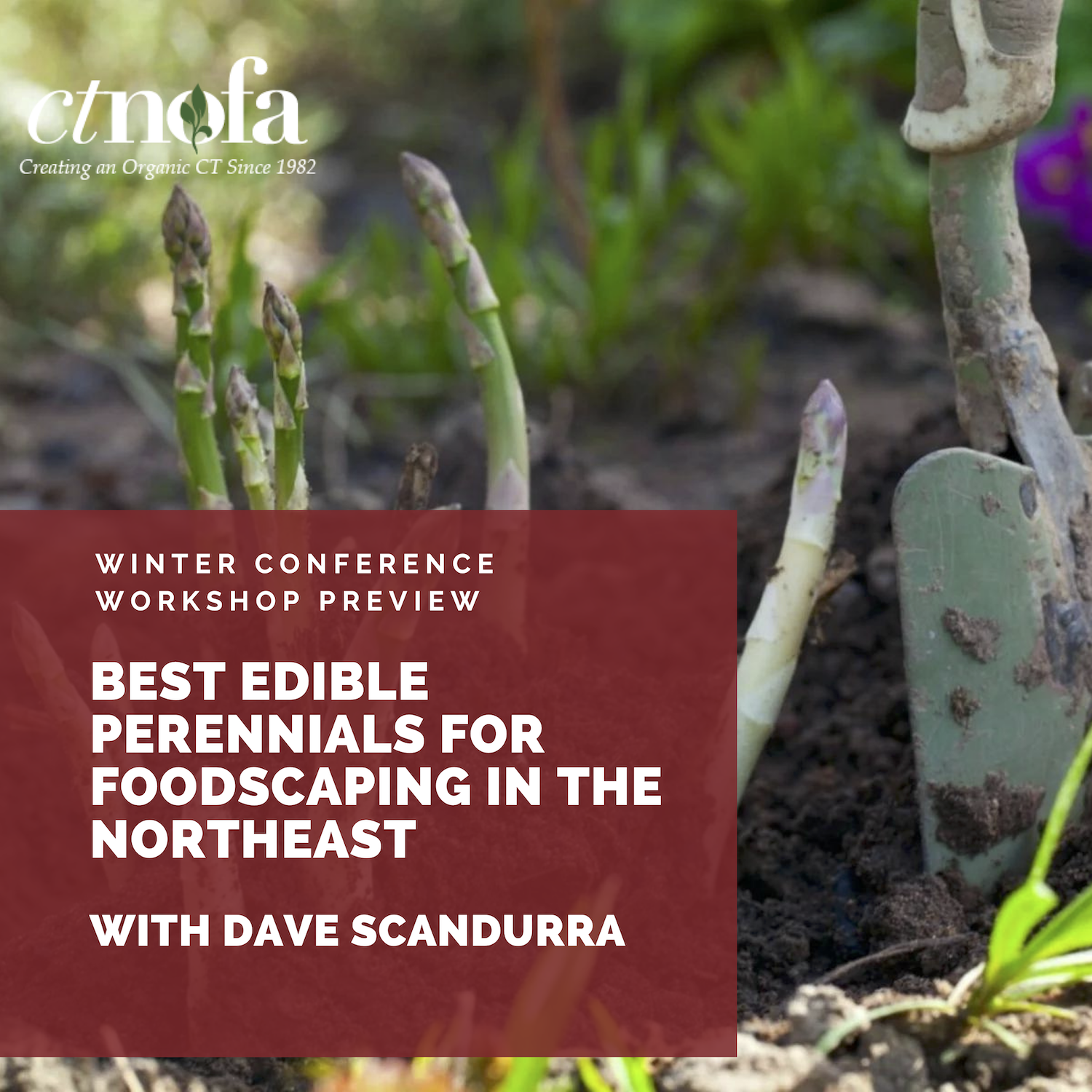
Best Edible Perennials for Foodscaping in the Northeast
7 PM
DAVE SCANDURRA | Edible Landscapes of Cape Cod
Tracks: Organic Land Care, Homesteading & Gardening
All about Edible Perennials! This presentation has exhaustive lists of edible perennial plants for sun, shade, moisture loving plants, plants with edible stalks, trees with edible leaves, shrubs, groundcovers, vines, medicinal plants, culinary/spice plants, plants with edible flowers, nitrogen fixing edible perennials, etc. Also the “top 30” edible perennial plants.
Friday, March 10th Workshops
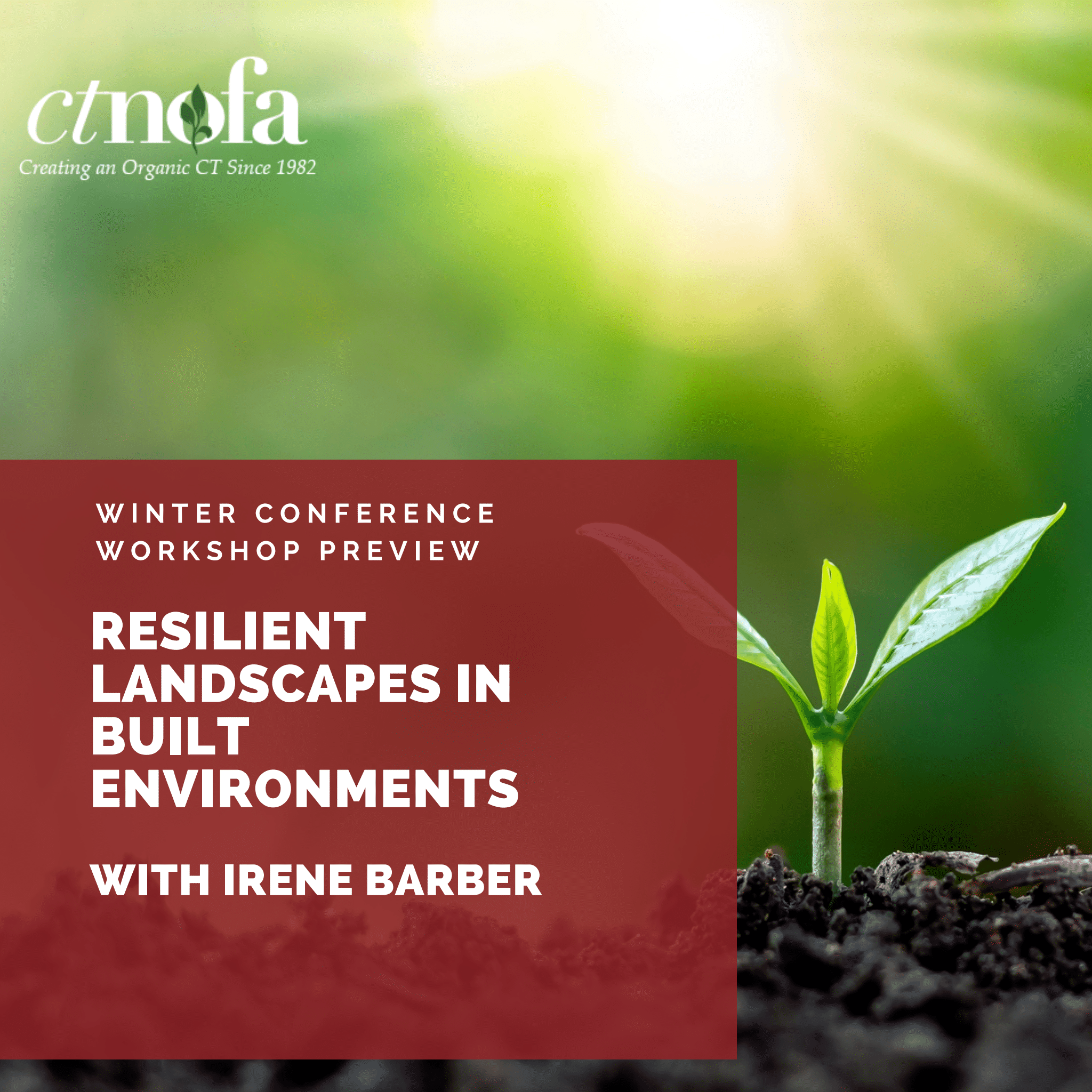
Resilient Landscapes in Built Environments
12 PM
IRENE BARBER | Coastal Maine Botanical Gardens
Tracks: Organic Land Care
Resilient landscaping practices are critical for maintaining healthy and productive environments, particularly in challenging urban and suburban work areas. This workshop focuses on nature-based designs that support healthy regeneration with high-performance results, even under stressful environmental conditions. Attendees will learn more about these ecological services that enable the landscape professional to evolve their business and succeed in a changing environment.
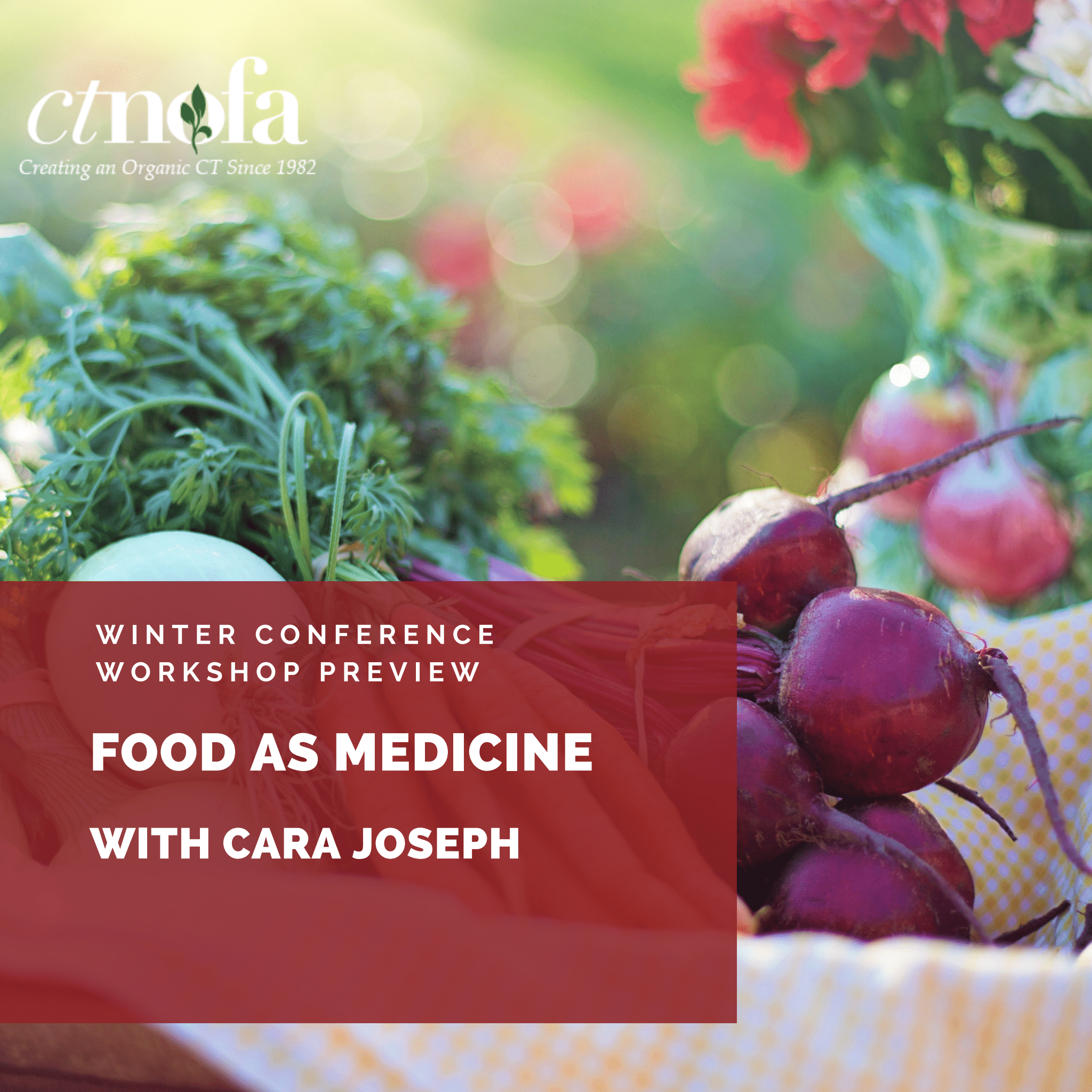
Food as Medicine
3 PM
CARA JOSEPH | Advanced Nutrition Response Testing Practitioner
Tracks: Homesteading & Gardening
Food can have a powerful impact on health, good and bad. Come learn how food can support your body, the importance of organic foods, and why non-GMO labeling isn’t organic. You will also learn why the current medical approach to health isn’t working and what you can do about it.
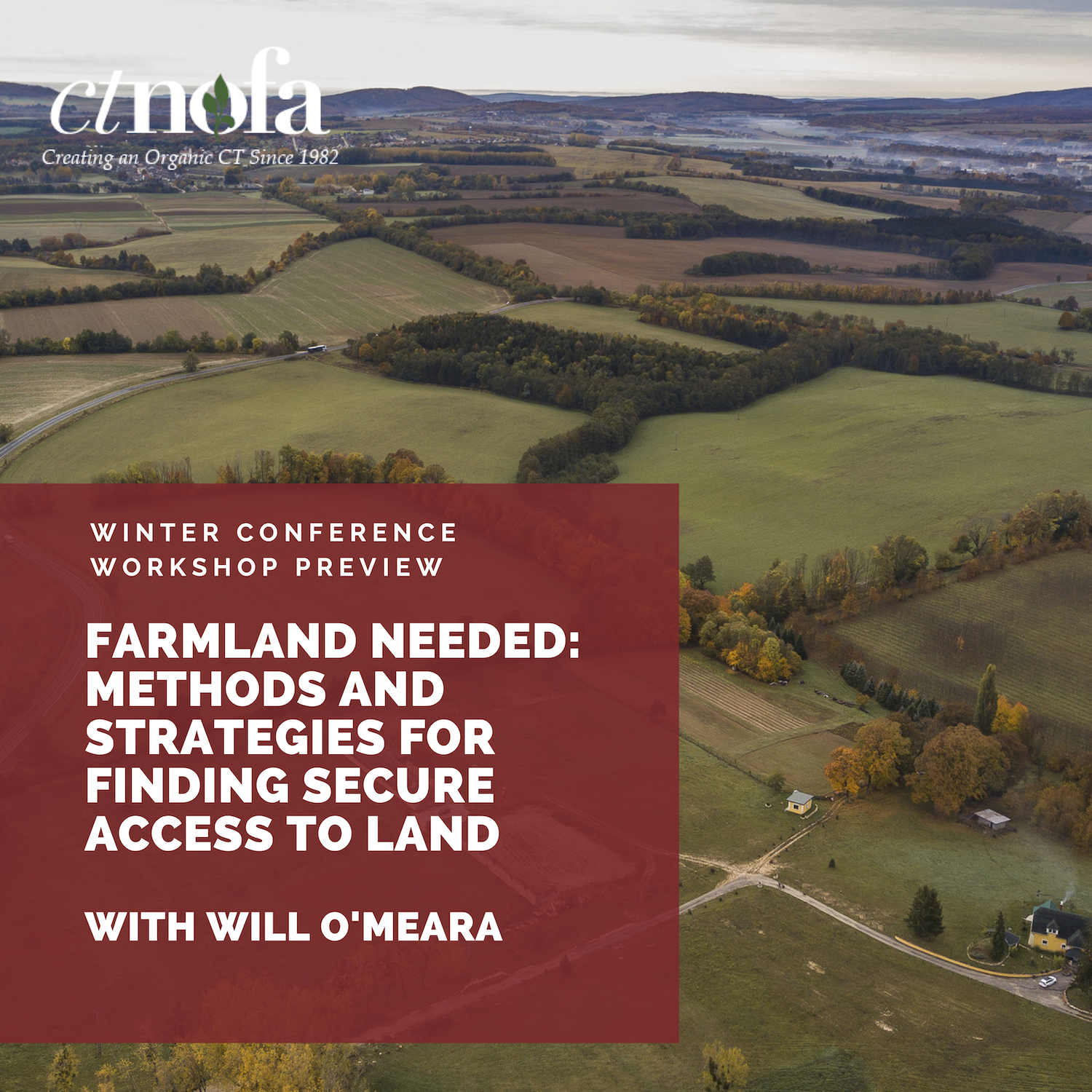
Farmland Needed: Methods and Strategies for Finding Secure Access to Land
7 PM
WILL O'MEARA | Land For Good
Tracks: Farming, Beginning Farmer
Farmland in Connecticut is increasingly expensive and hard to find. This workshop will cover a variety of methods for accessing farmland including purchasing, leasing, group land tenure, and more. We will discuss how to assess land for your farm’s needs, financing options, negotiation, and common challenges faced by farmers in our region. When not working for Land For Good, Will O’Meara is a farmer who operates on leased land, and will draw on his personal experience to help illustrate a variety of complex topics. Attendees are encouraged to share their own experiences and ask challenging questions in order to get the most out of our time.
Saturday, March 11th Workshops (live and in-person at Wesleyan University)
Expert Clinics (open all day)
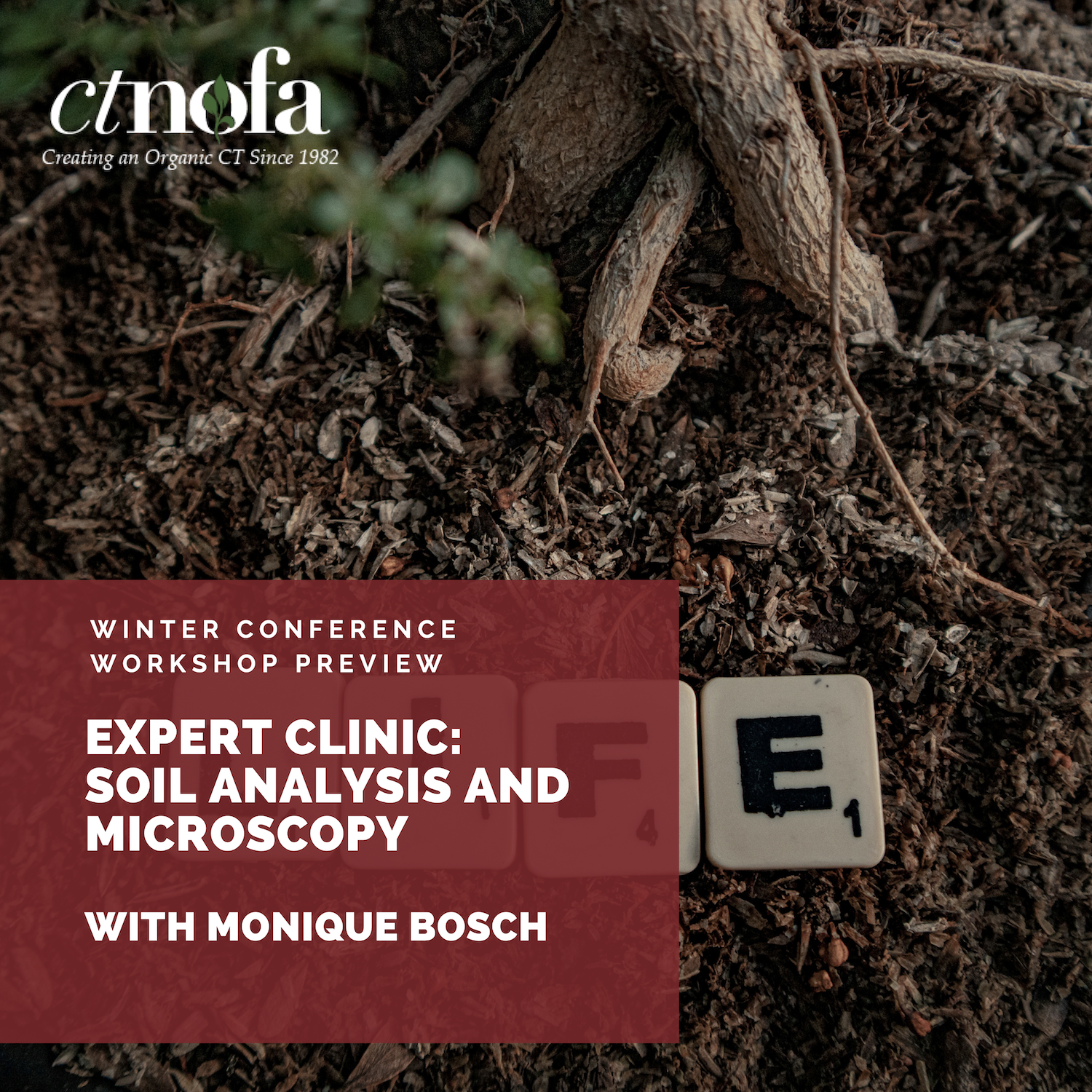
Soil Analysis and Microscopy
Open Throughout Conference
RUBEN PARRILLA, MELISSA MILLIKEN, and MONIQUE BOSCH
Tracks: EXPERT CLINIC
Throughout the in-person Saturday session of CT NOFA’s Winter Conference, we will have 3 soil health experts ⏤ Melissa Milliken, Ruben Parrilla, and Monique Bosch ⏤ ready to look at your soil or compost. Bring along a soil/compost sample that is currently active (growing plants/protected from frost). Together we will look at it under the microscope and give you feedback on the microbial life that exists, the bacterial/fungal ratio, and tips on how to improve your soil/compost to grow the healthiest food possible.
NOTE: When collecting a soil/compost sample, be sure to select from inside an active compost pile, or around the roots of living plants. Don’t seal the bag, since microbes need oxygen to survive.
session 1 (9:45am-11:00am)
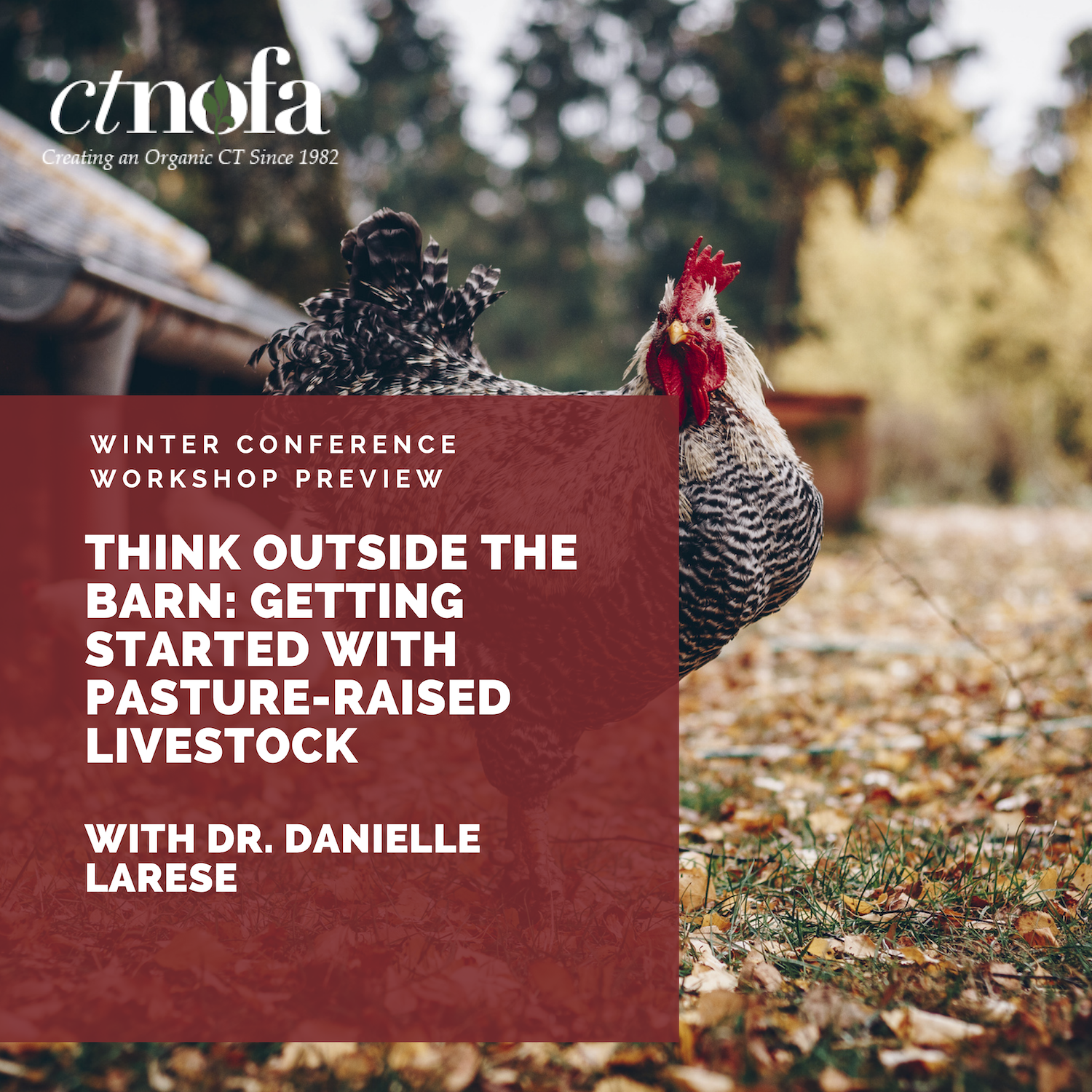
Think Outside the Barn: Getting Started with Pasture-Raised Livestock
SESSION 1 (9:45am-11:00am)
DR. DANIELLE LARESE | BOTL Farm
Tracks: Beginning Farmer, Farming
Interested in getting started with livestock? Set yourself apart! We’ll discuss the pros, cons, and infrastructure needs of raising animals on pasture instead of barn-raising. Then we’ll cover practical considerations for successfully pasture-raising animals (including fencing, water, electricity, feed storage, rotational grazing, shelter, medical care, breed selection, parasites, and socialization).
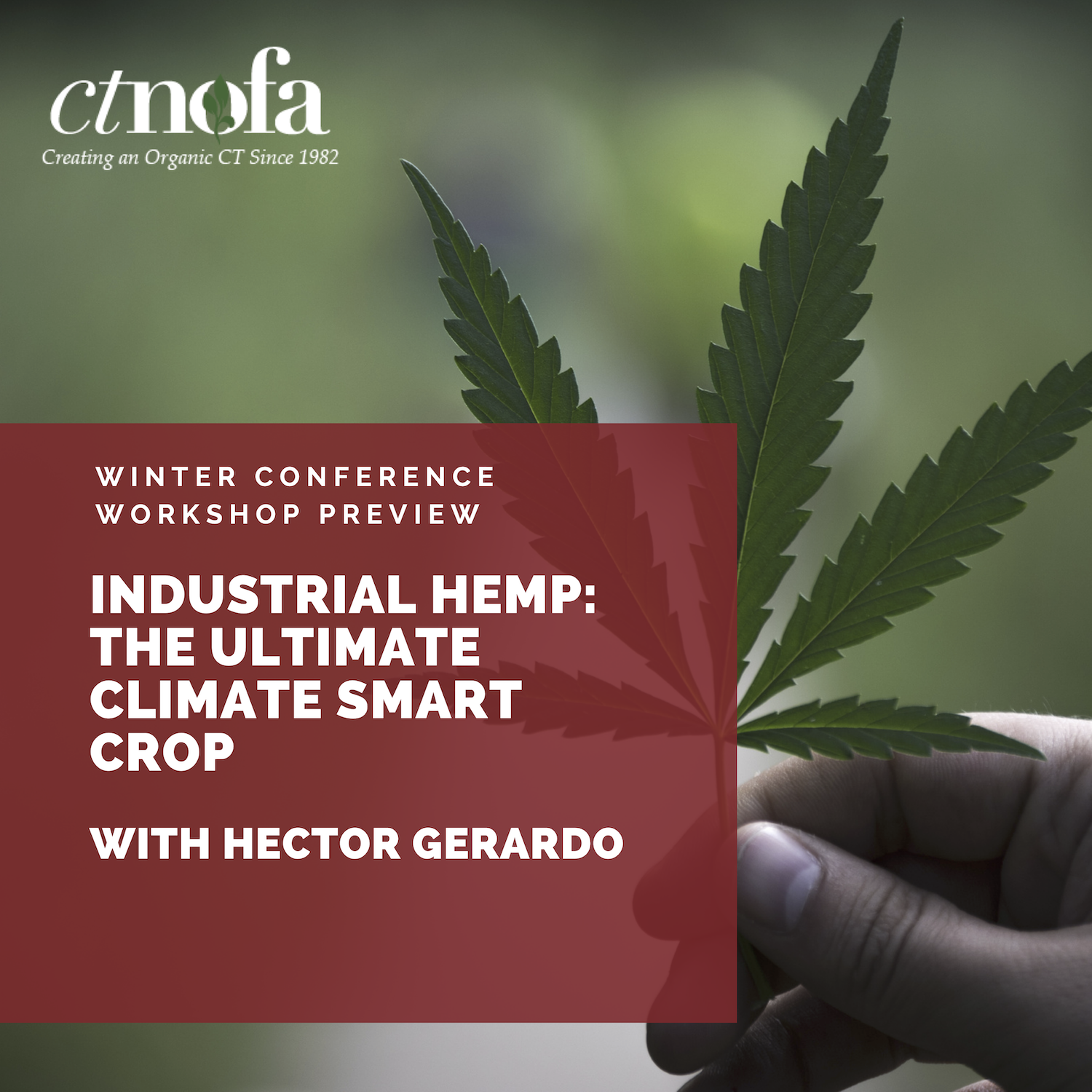
Industrial Hemp: The Ultimate Climate Smart Crop
SESSION 1 (9:45am-11:00am)
HECTOR GERARDO | SEAmarron Farmstead
Tracks: Farming
Hemp is one the most versatile plant on the planet. In this workshop, participants will learn the various ways hemp can be used on the farm — regardless of the size of their land — from regenerative farming, to promoting soil health, and as a cash crop. Topics will include oils, flowers, hempcrete, biomass, and carbon sequestration.
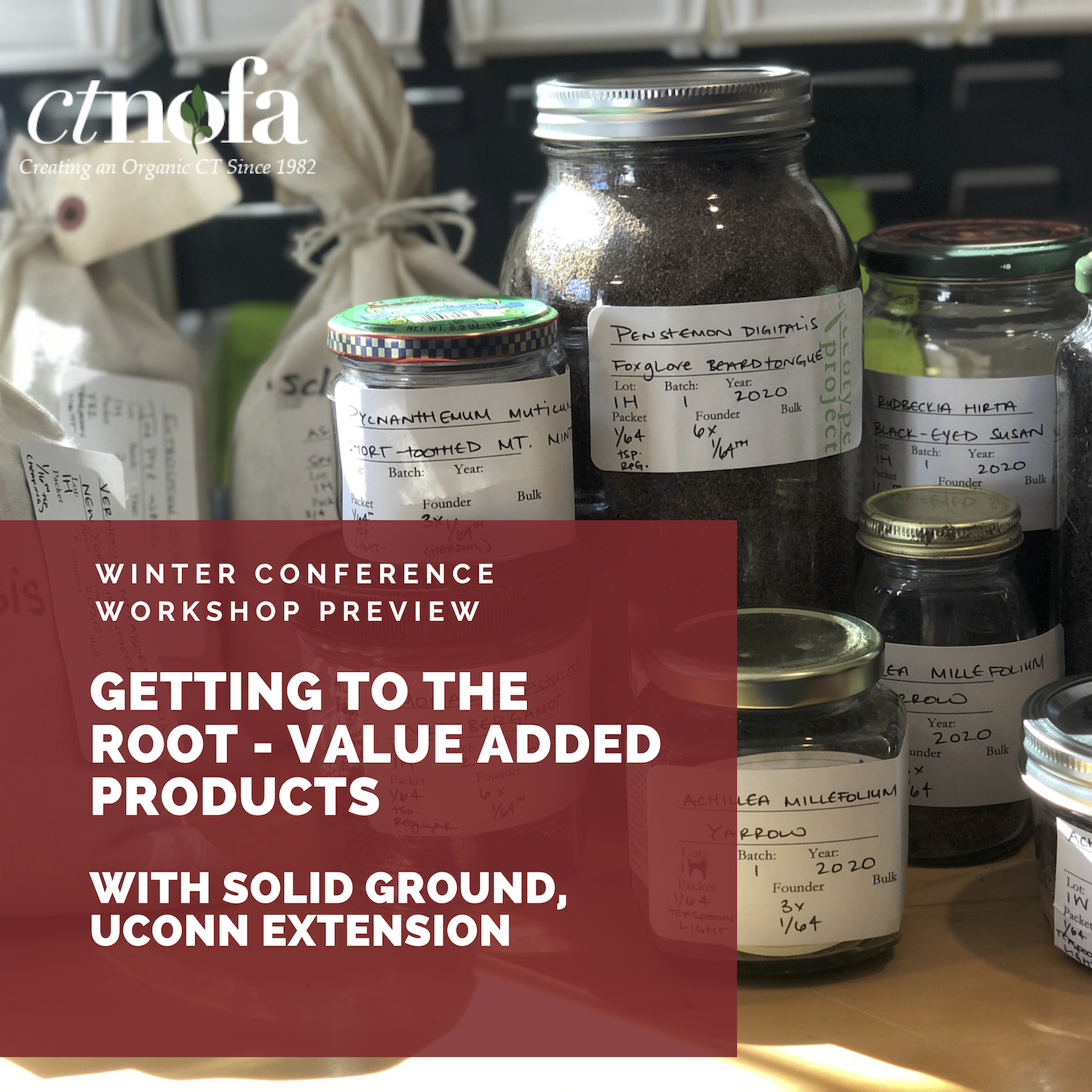
Getting To The Root ⏤ Value Added Products
SESSION 1 (9:45am-11:0am)
SOLID GROUND, UCONN EXTENSION
Tracks: Farming
UConn Extension’s Solid Ground Program continues its Getting To The Root Series, featuring short videos (5 min) + farmer panel discussions, exploring the entrepreneurial spirit of new farmers. This workshop features farmers Richard Myers and Shawn Joseph of Park City Harvest, with a panel of growers to discuss value-added products.
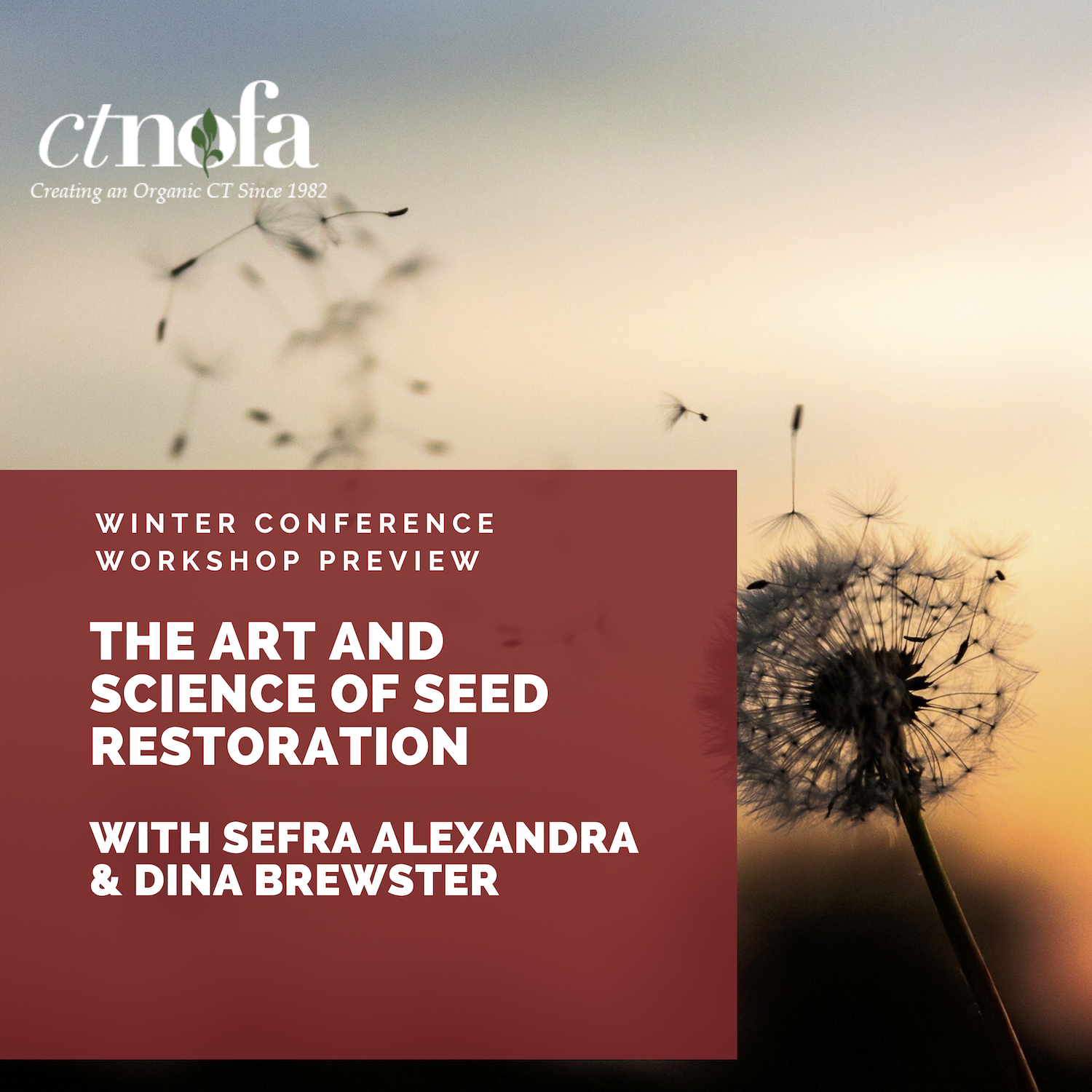
The Art and Science of Seed Restoration
SESSION 1 (9:45am-11:00am)
SEFRA ALEXANDRA & DINA BREWSTER
Tracks: Homesteading & Gardening, Farming, Soil Health
In this workshop, you’ll learn about the emerging market of restoration seed. Discover how farmers can get involved, both as users and producers of ecotypic seed (native perennials that feed our pollinators). The rewilding of our farm and home landscapes is an essential part of our collective response to climate change and the consequent loss of biodiversity. Join us to learn how you can be a part of this growing movement of northeast seed farmers.
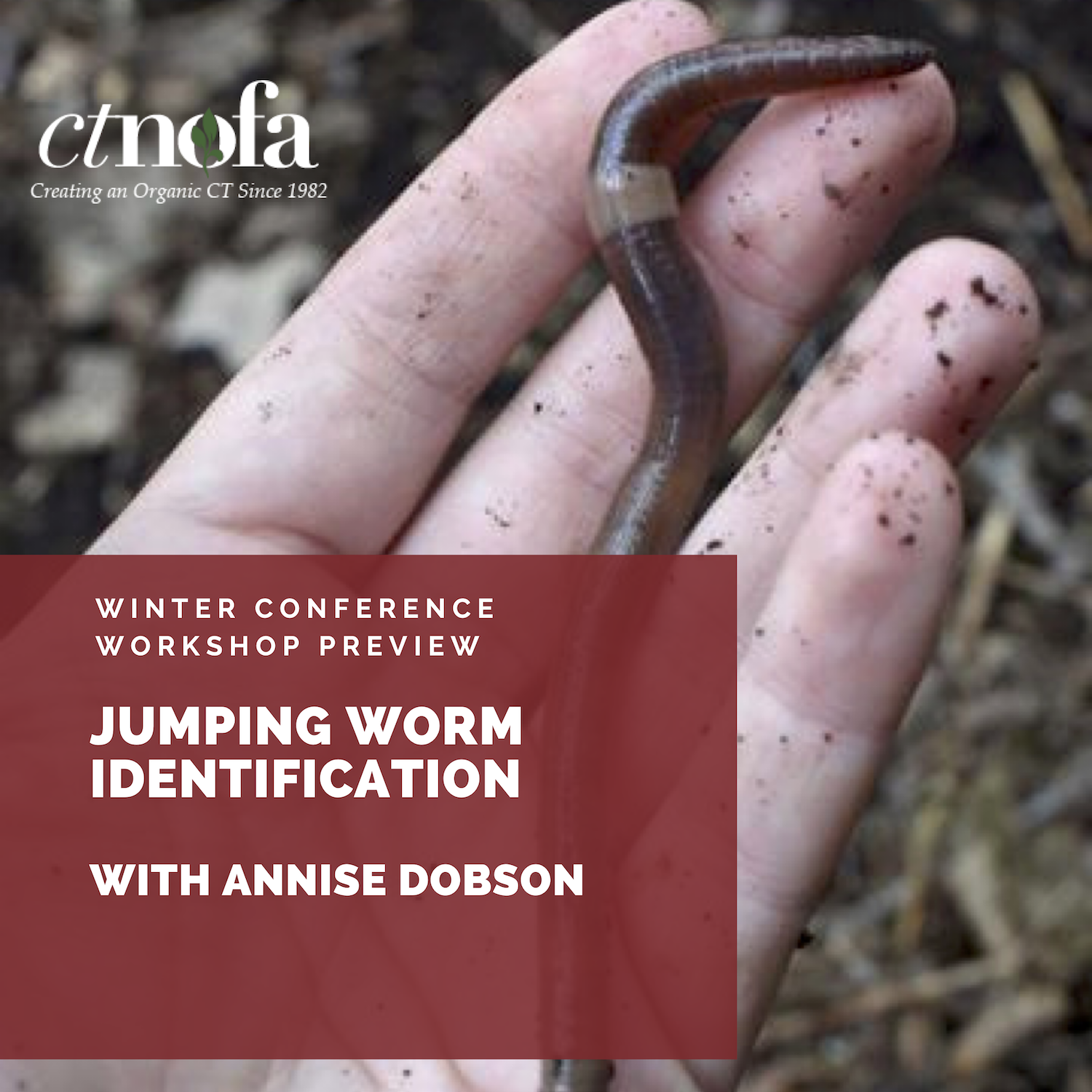
Jumping Worm Identification
SESSION 1 (9:45am-11:00am)
ANNISE DOBSON | Yale School of the Environment
Tracks: Organic Land Care
Learn about invasive jumping worm impacts, identification, and steps to limit their spread.
session 2 (11:15am-12:30pm)
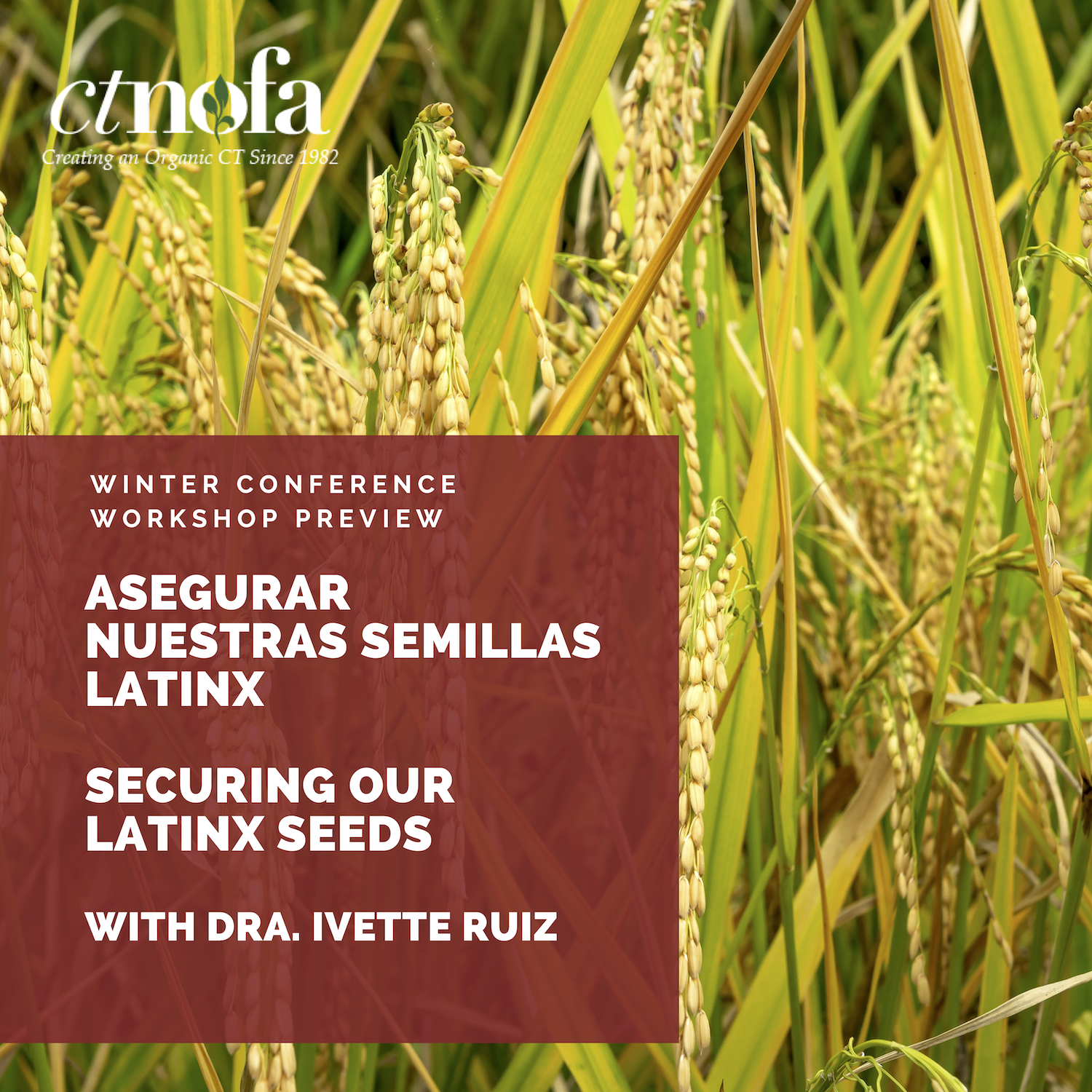
Asegurar Nuestras Semillas Latinx / Securing Our Latinx Seeds
SESSION 2 (11:15am-12:30pm)
DR. IVETTE RUIZ | Healing by Growing Farms
Tracks: Farming, Homesteading & Gardening, Activism & Policy
Nuestra herencia Latinx y genética cultural es clave para una agricultura resiliente y de base ecológica. Sin embargo, la genética de nuestras plantas de cultivo son amenazadas en muchos frentes. El conocimiento sobre cómo conseguir y guardar semillas que representan nuestra herencia y cultura es vital a nuestra futuro.
Our Latinx heritage and cultural genetics are key to resilient, eco-based agriculture. However, the genetics of our crop plants are threatened on many fronts. Knowledge about how to get and save seeds that represent our heritage and culture is vital to our future.
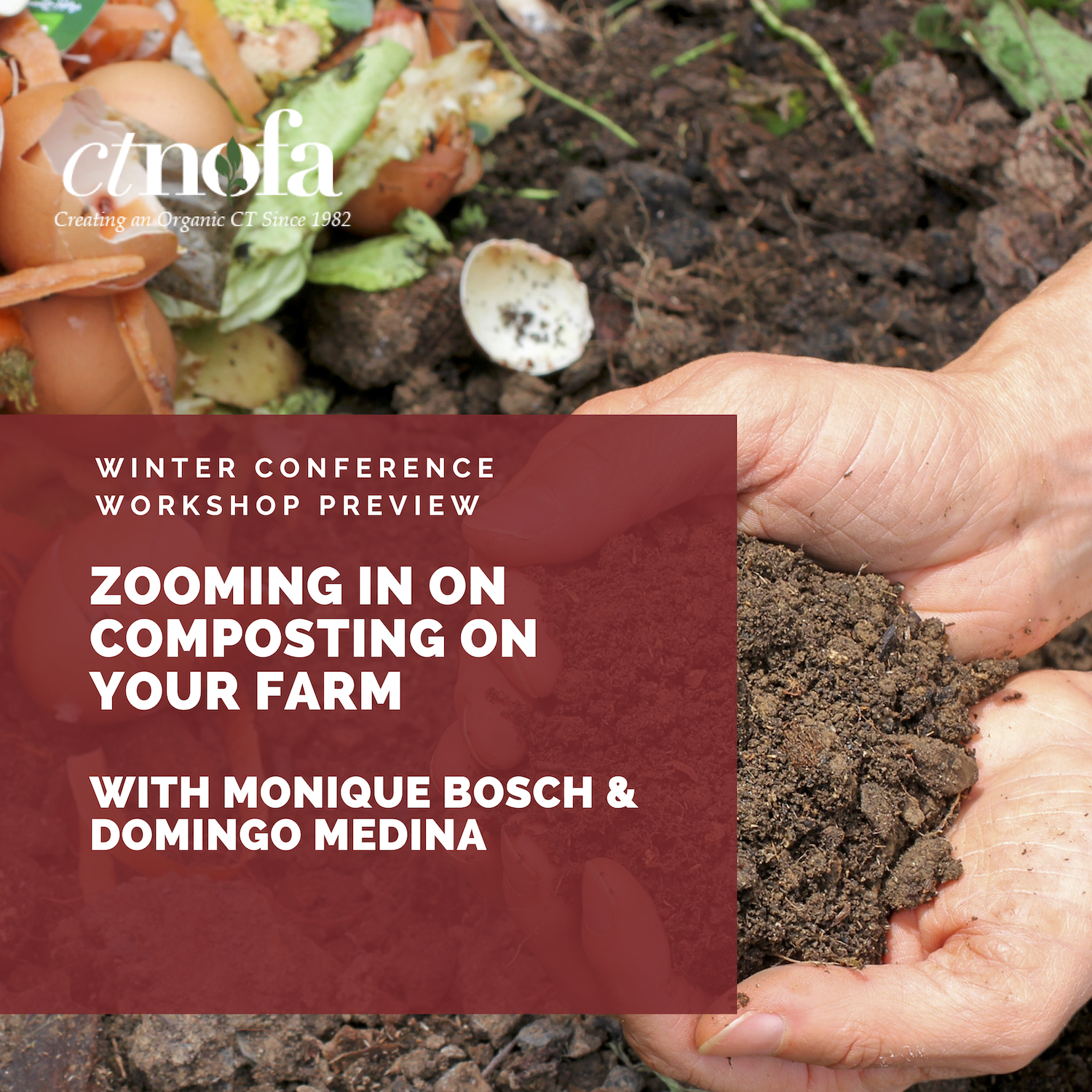
Zooming In On Composting On Your Farm
SESSION 2 (11:15am-12:30pm)
DOMINGO MEDINA & MONIQUE BOSCH
Tracks: Farming, Soil Health
Join Domingo Medina and Monique Bosch as they share their methods of composting, with the goal of creating amendments that ensure your soil is healthy and alive. We’ll look at compost, worm castings, and compost tea under the microscope and learn how beneficial microbes help us grow nutrient dense food.
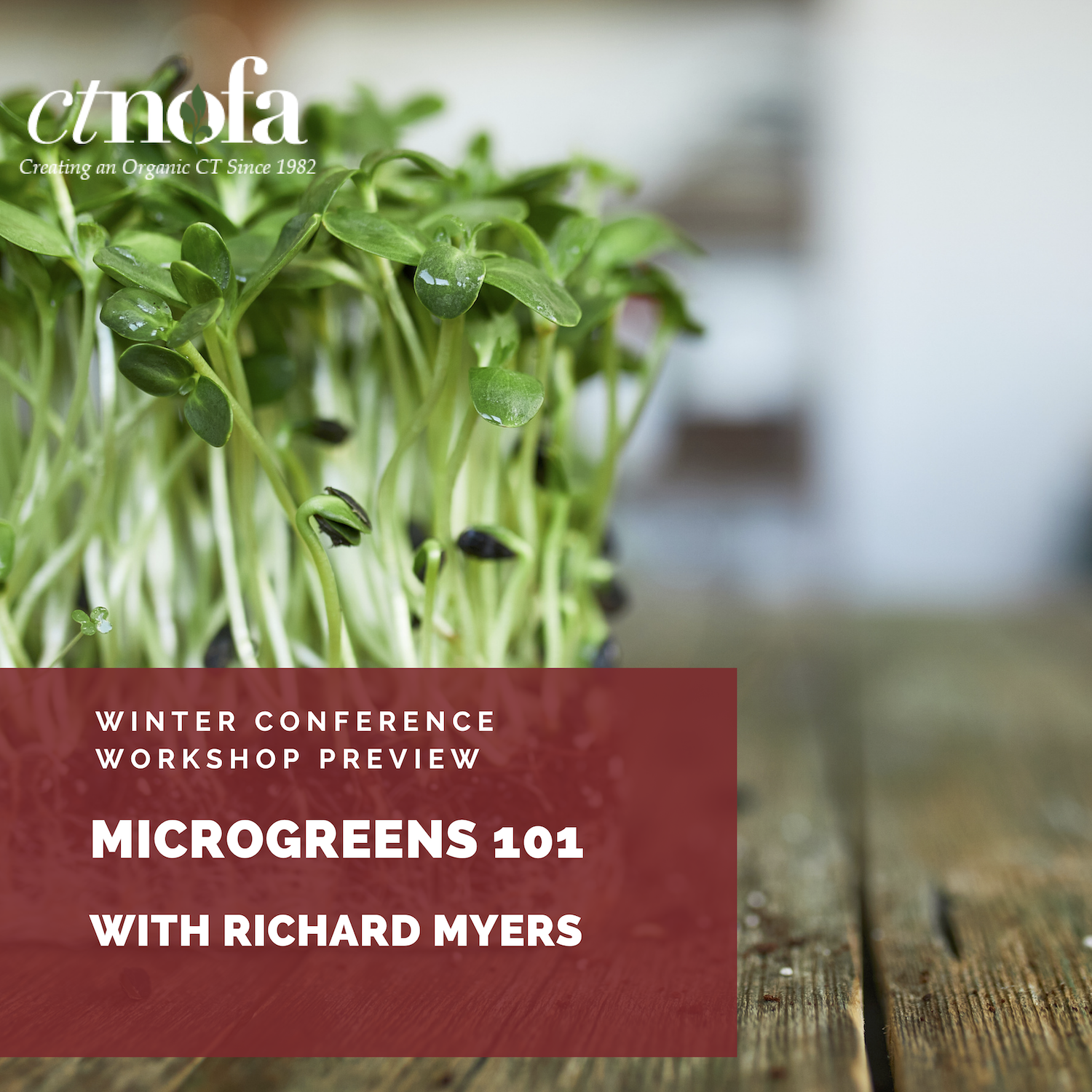
Microgreens 101
SESSION 2 (11:15am-12:30pm)
RICHARD MYERS | Park City Harvest, LLC
Tracks: Beginning Farmer, Farming
In this workshop, attendees will learn what it takes grow a microgreens operation inside or outside your home. Topics covered will include what equipment is needed, along with types of crops, soil ,seeds, how much they typically sell for, and the nutritional factors associated with microgreens.
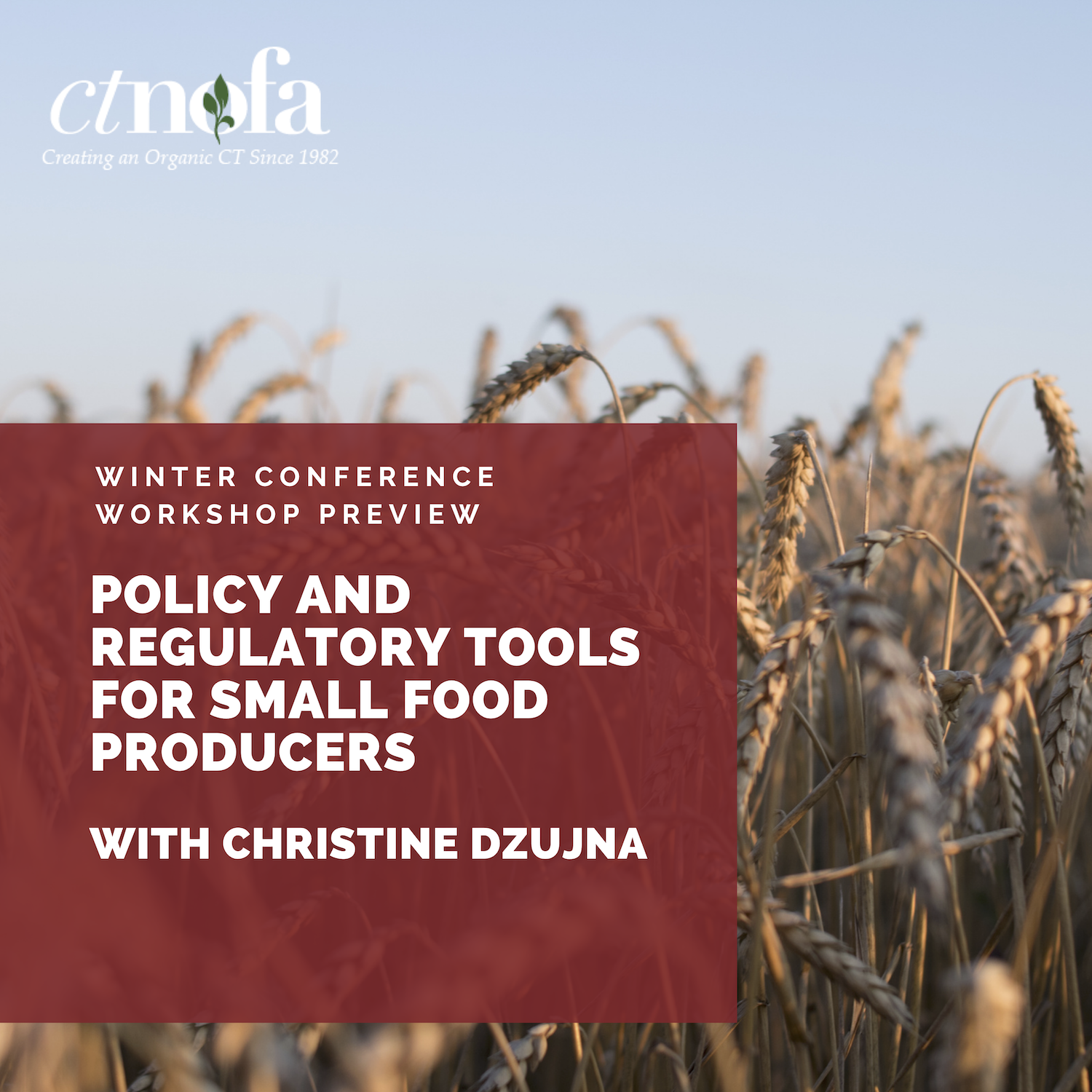
Policy and Regulatory Tools For Small Food Producers
SESSION 2 (11:15am-12:30pm)
CHRISTINE DZUJNA | Farm-to-Consumer Legal Defense Fund
Tracks: Activism & Policy, Farming
We will explore federal, state, and local regulations that impact small food producers (e.g. meat processing, egg sales, raw dairy, cottage food, etc.), and the legal solutions that can help them remain viable and grow. We will review legislative, policy, and advocacy tools that can expand food freedom for all.
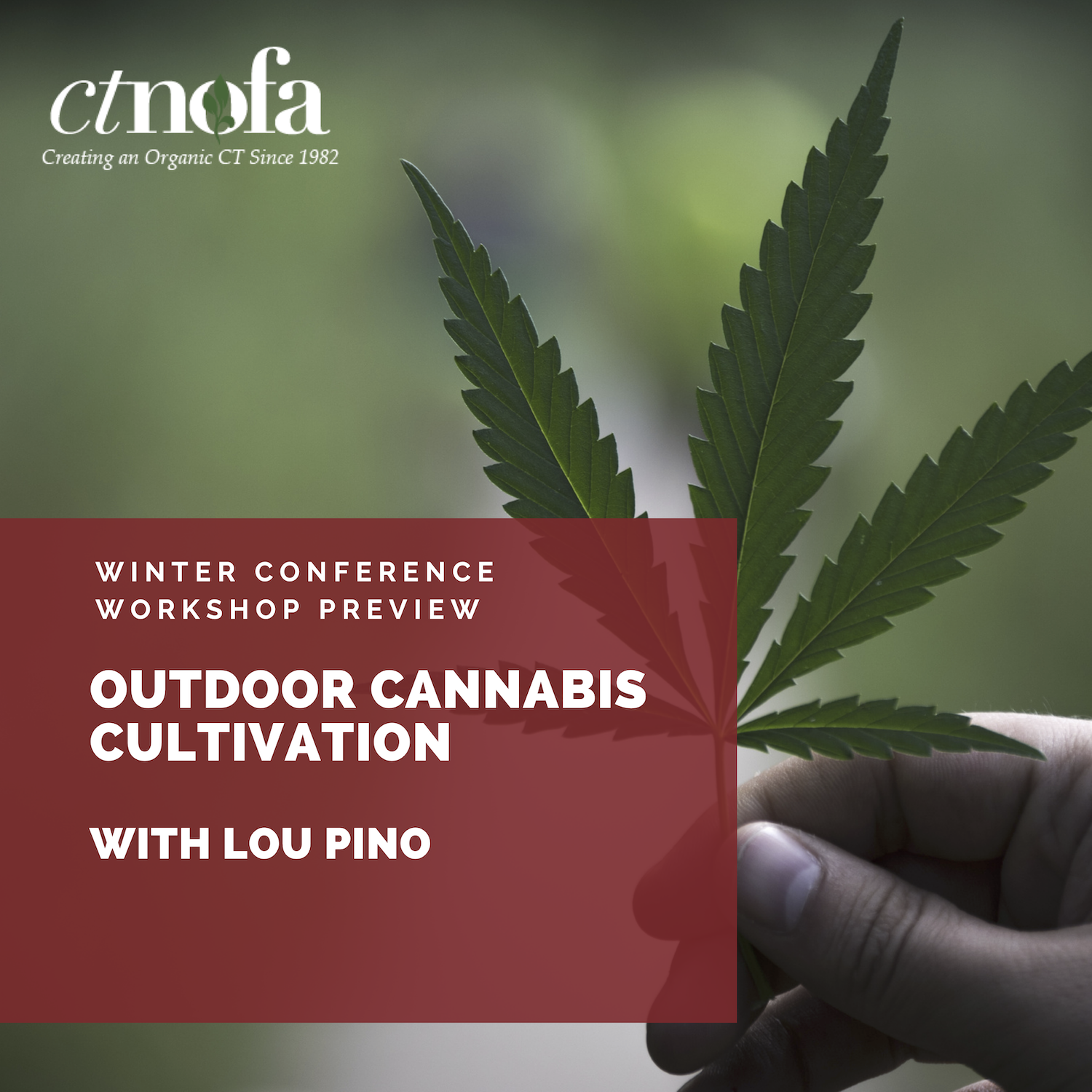
Outdoor Cannabis Cultivation
SESSION 2 (11:15am-12:30pm)
LOU PINO | Gene Traders
Tracks: Homesteading & Gardening, Farming
This workshop will cover different methods currently used to cultivate cannabis outdoors in different parts of the country and the world. We will highlight environmental impacts and environmental benefits of cultivating the cannabis plant outside.
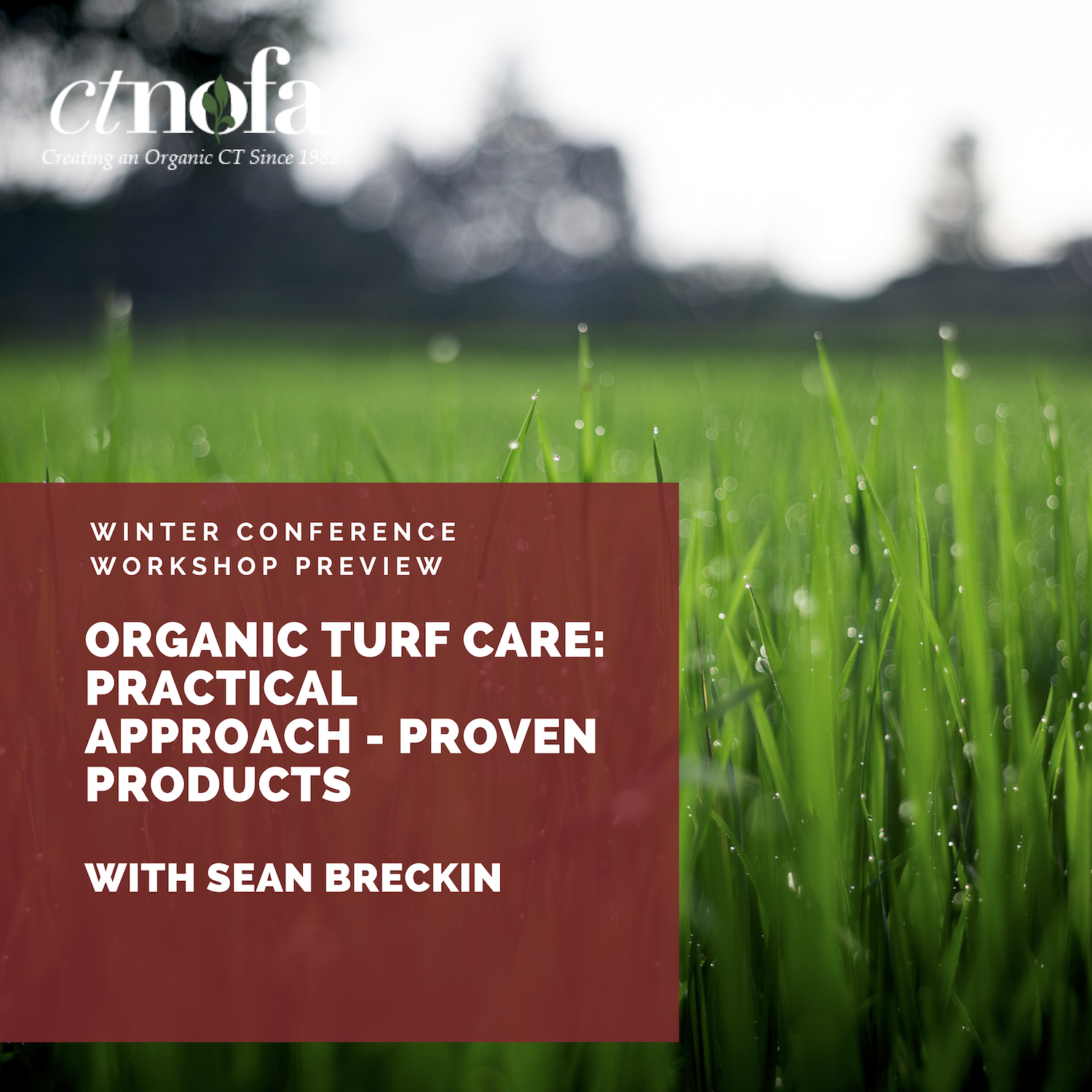
Organic Turf Care: Practical Approach ⏤ Proven Products
SESSION 2 (11:15am-12:30pm)
SEAN BRECKIN | PJC Organic
Tracks: Organic Land Care
Sean Breckin from PJC Organic will take you through their step-by-step development of organic turf programs. You will learn the principles of organic turf care through the lens of our “Healthy Turf Circle.” We take a deeper dive into soil health and the best products to grow high performance turf grass.
session 3 (4:15pm-5:30pm)
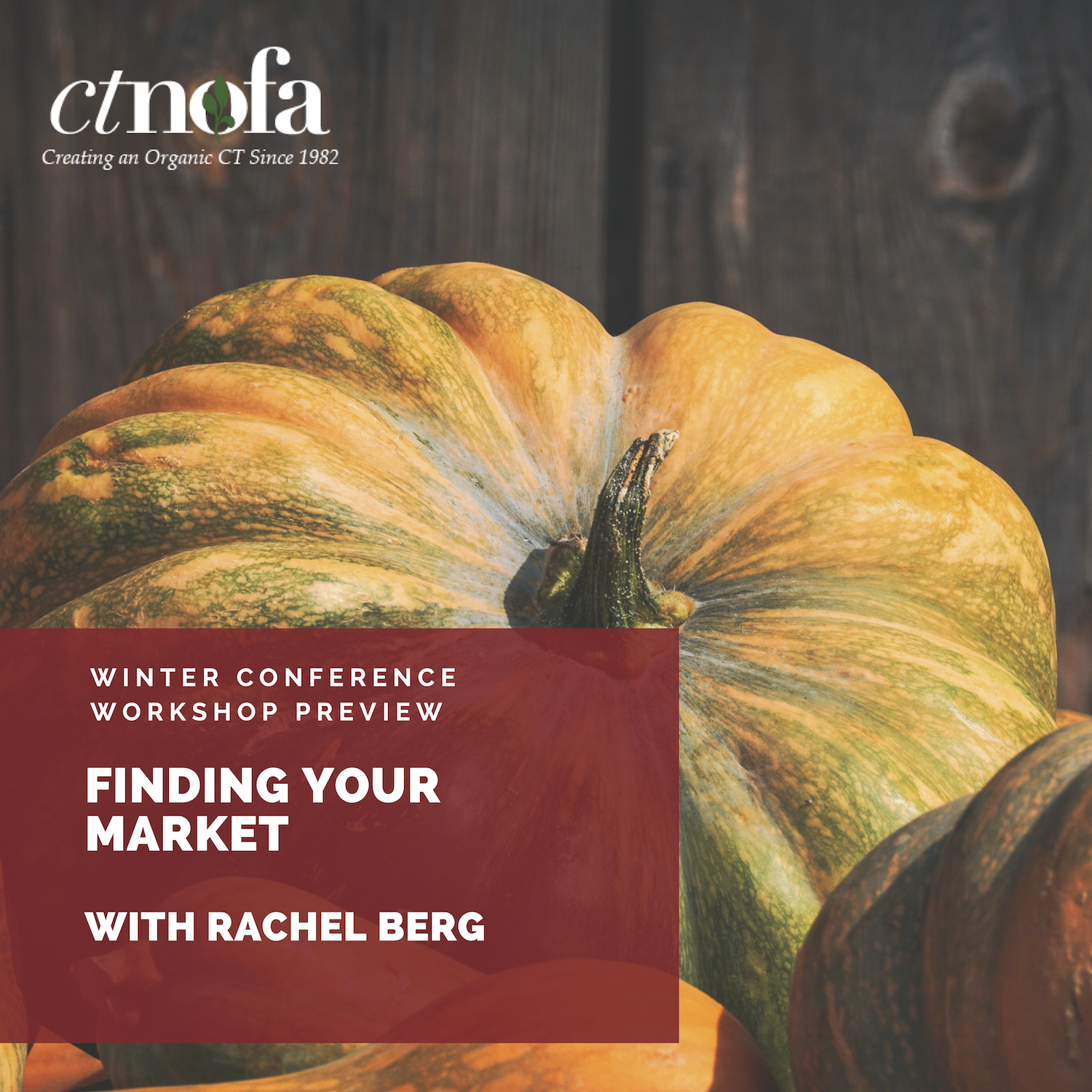
Finding Your Market
SESSION 3 (4:15pm-5:30pm)
RACHEL BERG
Tracks: Beginning Farmer, Farming
In this workshop, we talk about how to choose the right sales outlets for your farm. Should you sell retail or wholesale? Should you go to Farmers’ Markets or offer a CSA? We will share pros and cons for each option and discuss what considerations should go into your decision.
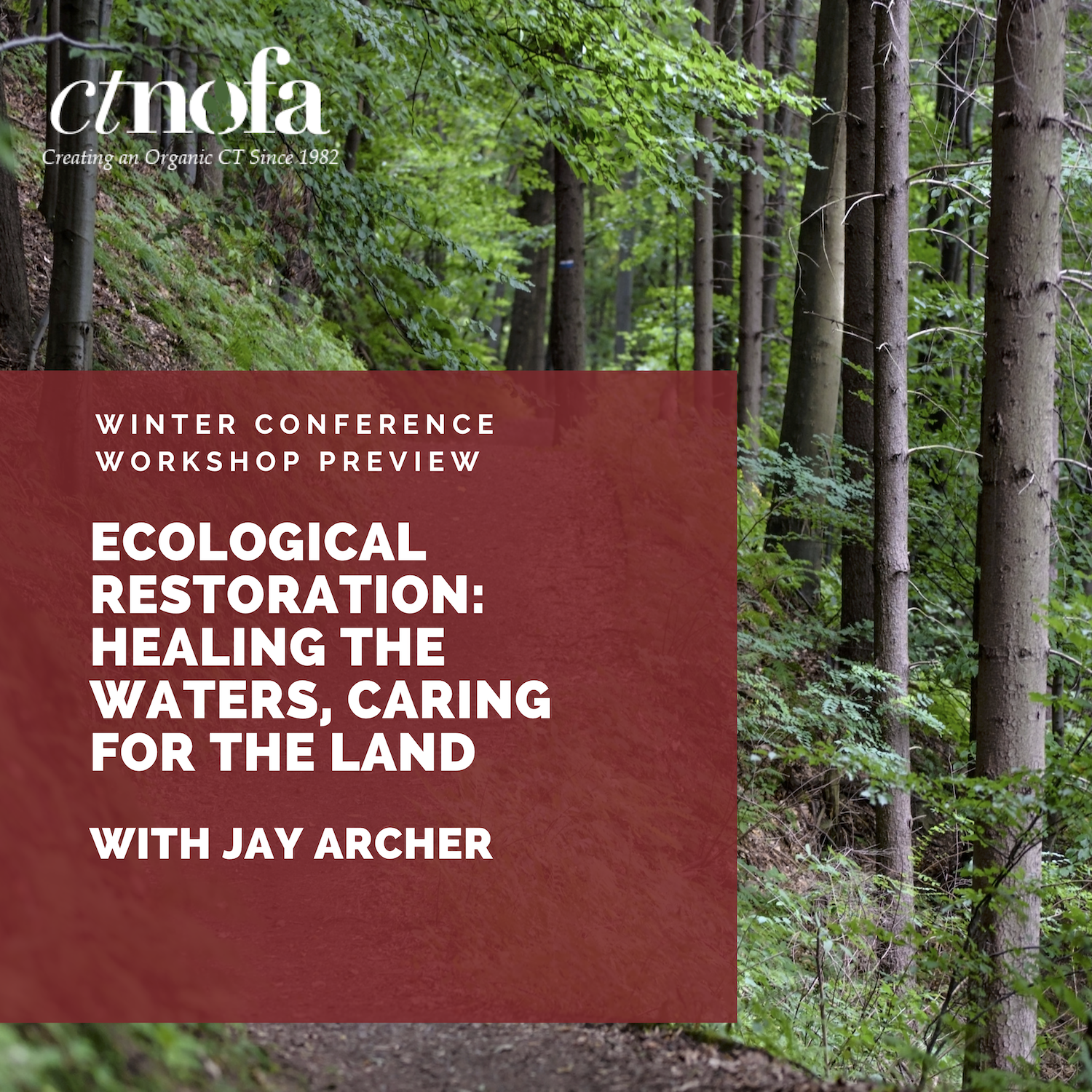
Ecological Restoration: Healing the Waters, Caring for the Land
SESSION 3 (4:15pm-5:30pm)
JAY ARCHER | Green Jay Landscape Design
Tracks: Organic Land Care, Soil Health
Improve the health of the environment by creating and maintaining naturally beautiful landscape environments which improve human health, prevent premature aging, and heal and strengthen our immune systems. Restore the balance of nature while conserving, preserving, and protecting our most precious resource with native plants and healthy organic soil.
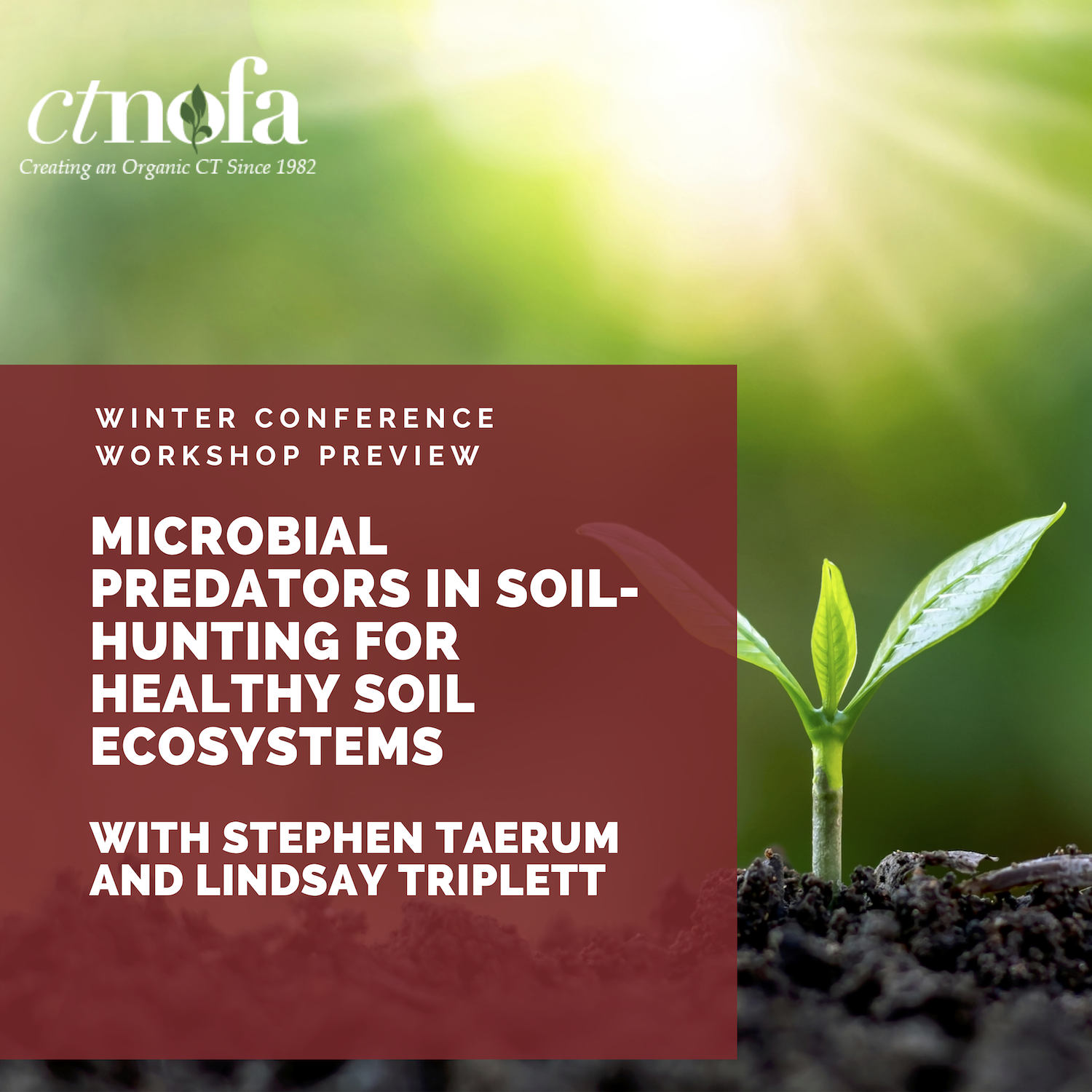
Microbial Predators in Soil ⏤ Hunting for Healthy Soil Ecosystems
SESSION 3 (4:15pm-5:30pm)
STEPHEN TAERUM & LINDSAY TRIPLETT
Tracks: Soil Health
Bacteria-eating predators, like nematodes, protists, and viruses, shape soil microbiomes to naturally support soil nutrition and suppress pathogens. This workshop will share the latest knowledge on how predators support healthy plants. Your feedback will help us shape national research efforts to address the organic community’s needs around this topic.
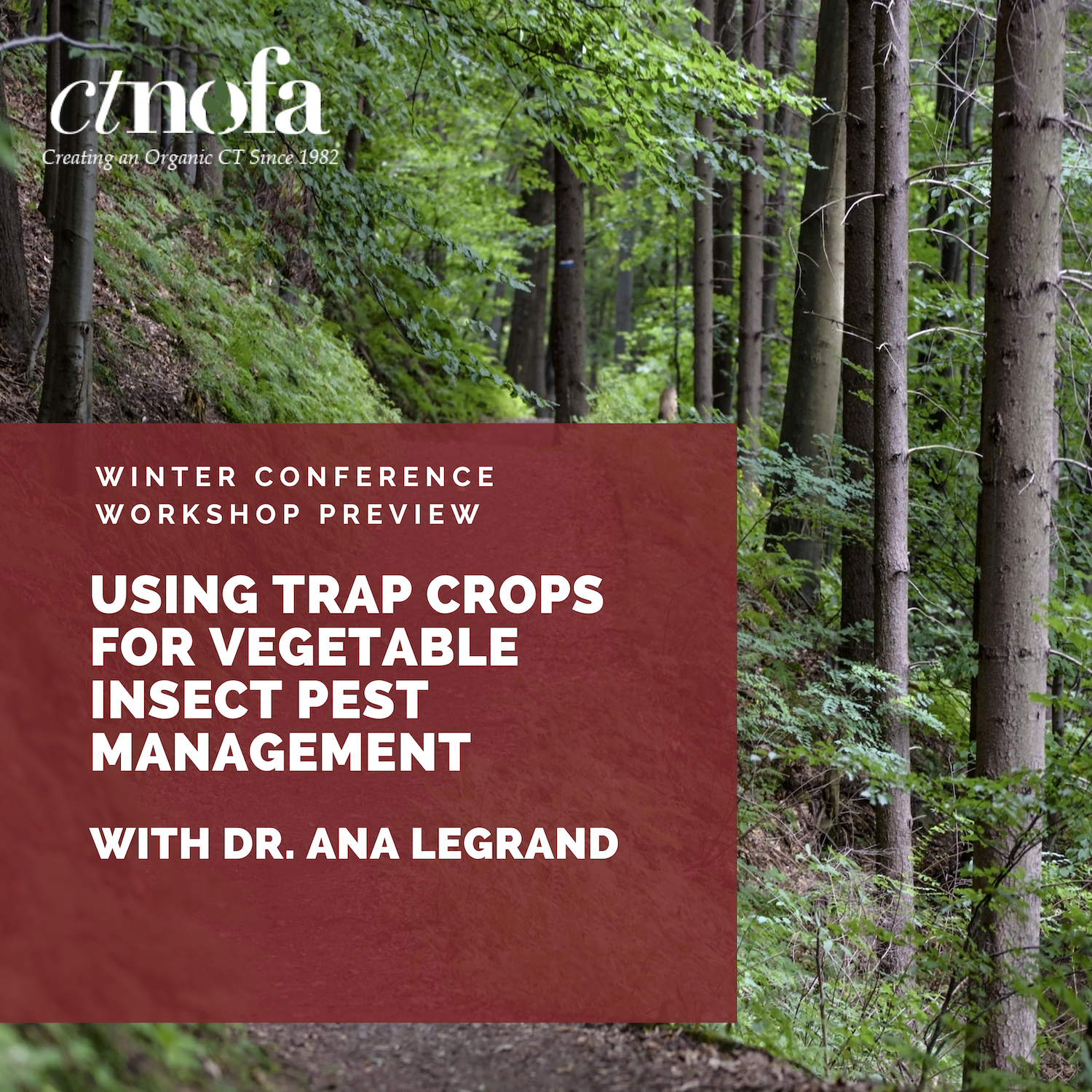
Using Trap Crops For Vegetable Insect Pest Management
SESSION 3 (4:15pm-5:30pm)
DR. ANA LEGRAND | University of Connecticut
Tracks: Farming
Trap crops are an important cultural control that can help organic growers in their pest management efforts. This presentation will cover how trap crops work, examples of their use in various vegetable crops and updates from ongoing research at the University of Connecticut.
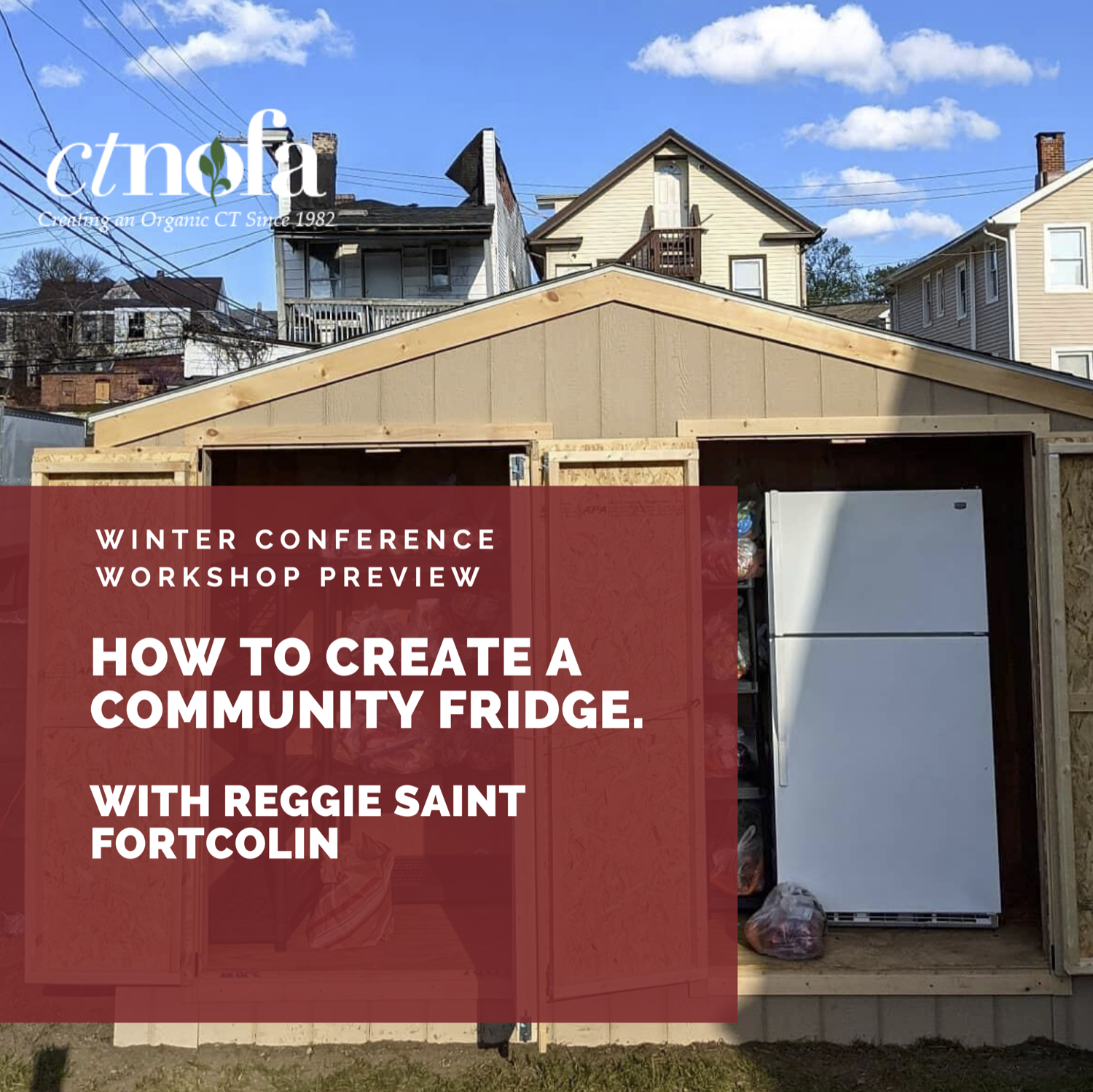
How to Create a Community Fridge
SESSION 3 (4:15pm-5:30pm)
REGGIE SAINT FORTCOLIN
Tracks: Activism & Policy
TBD
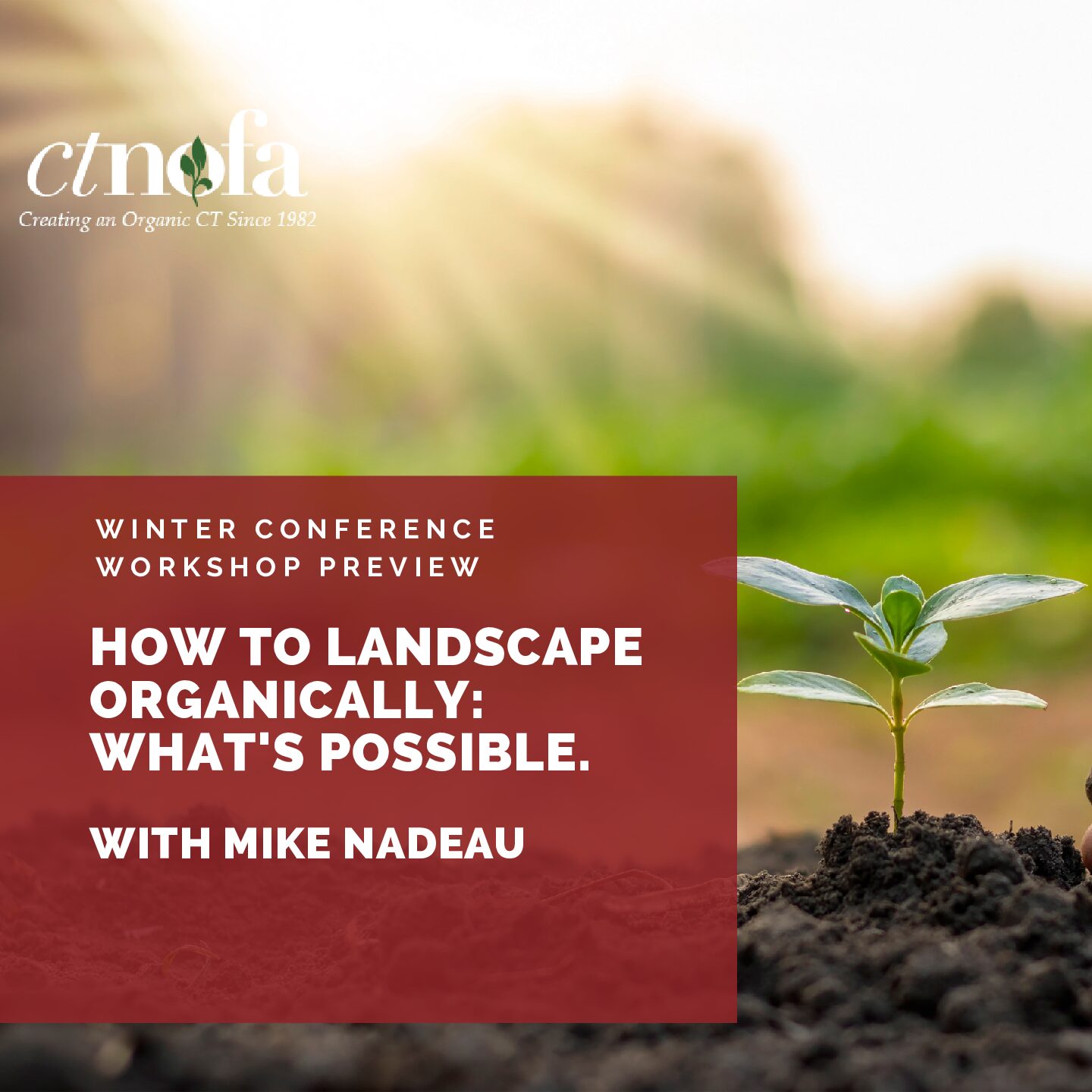
How to Landscape Organically: What’s Possible
SESSION 3 (4:15pm-5:30pm)
MIKE NADEAU | Wholistic Land Care Consulting, LLC
Tracks: Organic Land Care
Learn what organic landcare is and why you should be doing it. Learn what’s possible, with practical information from actual projects – including easy mistakes to make, so you won’t repeat them. Discussion will include how to get started, transitioning to organic, and how to keep it sustainable.
